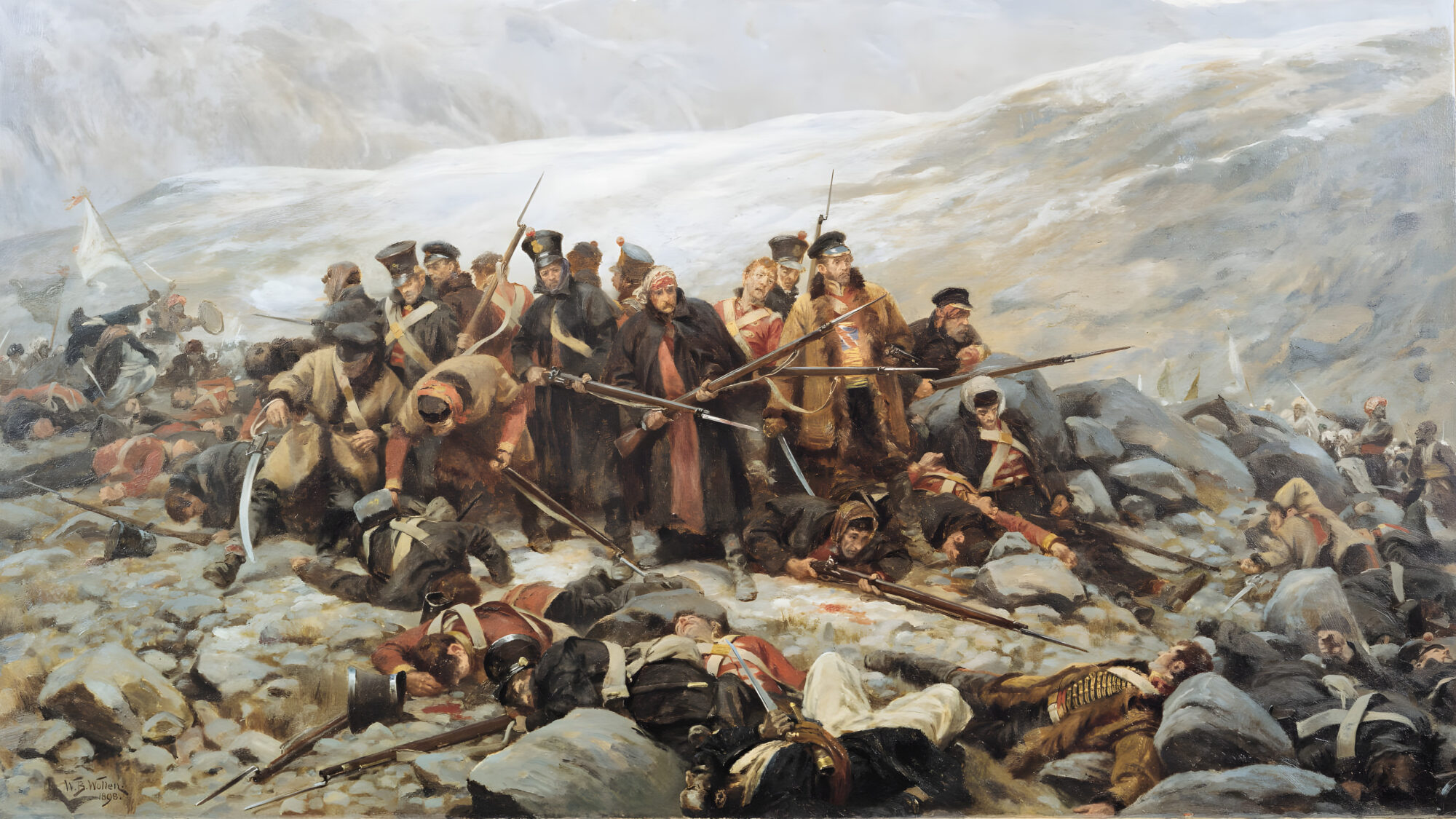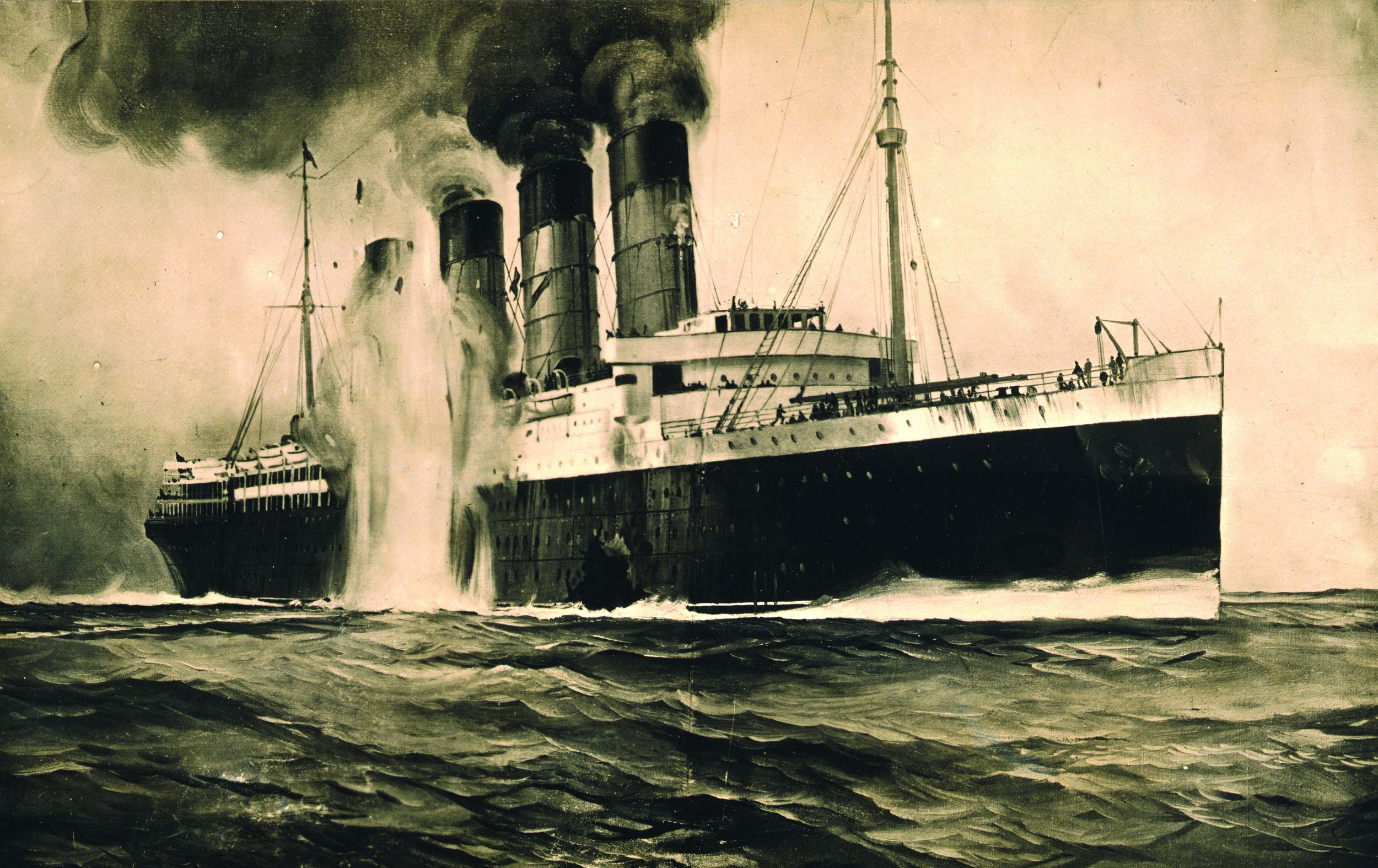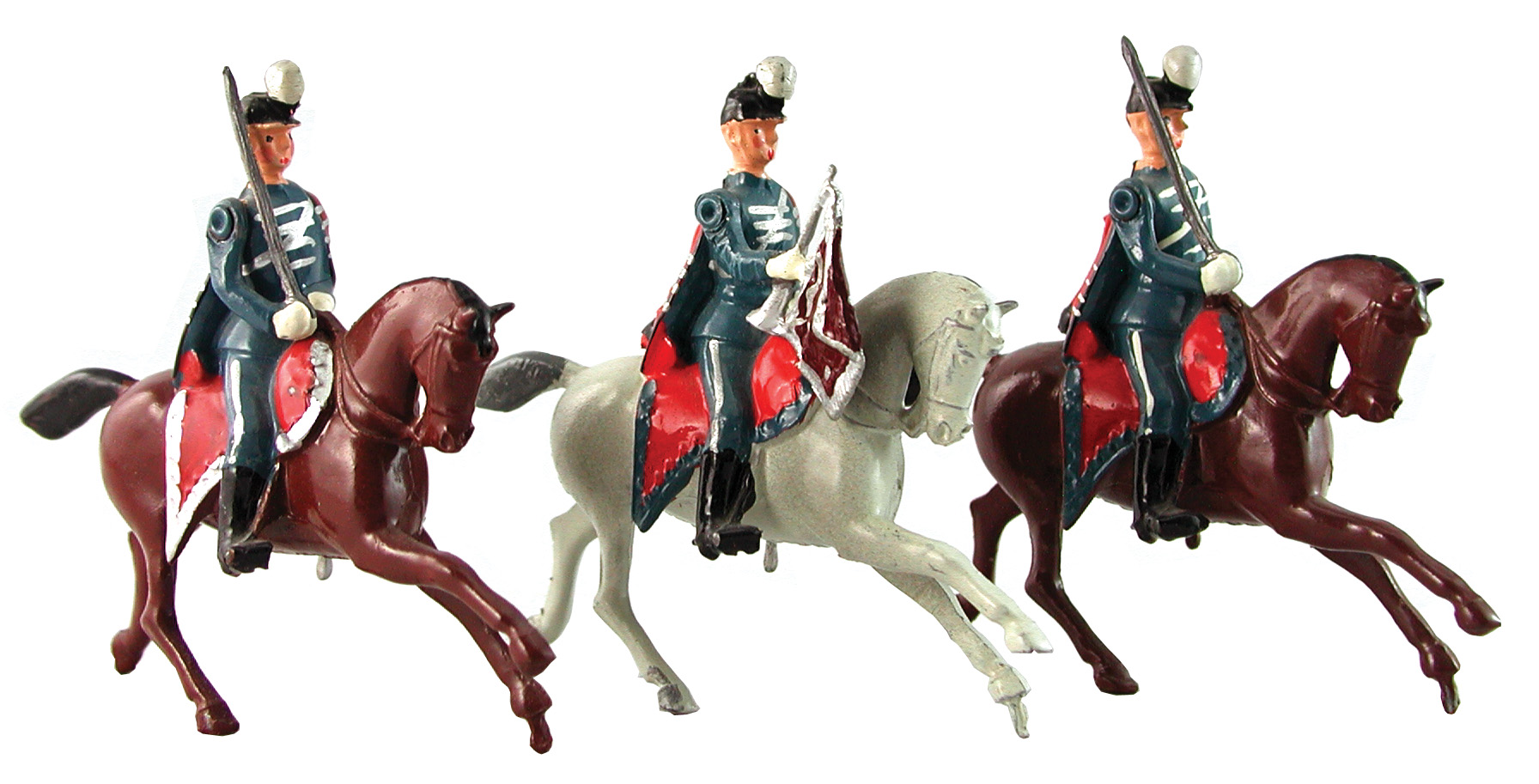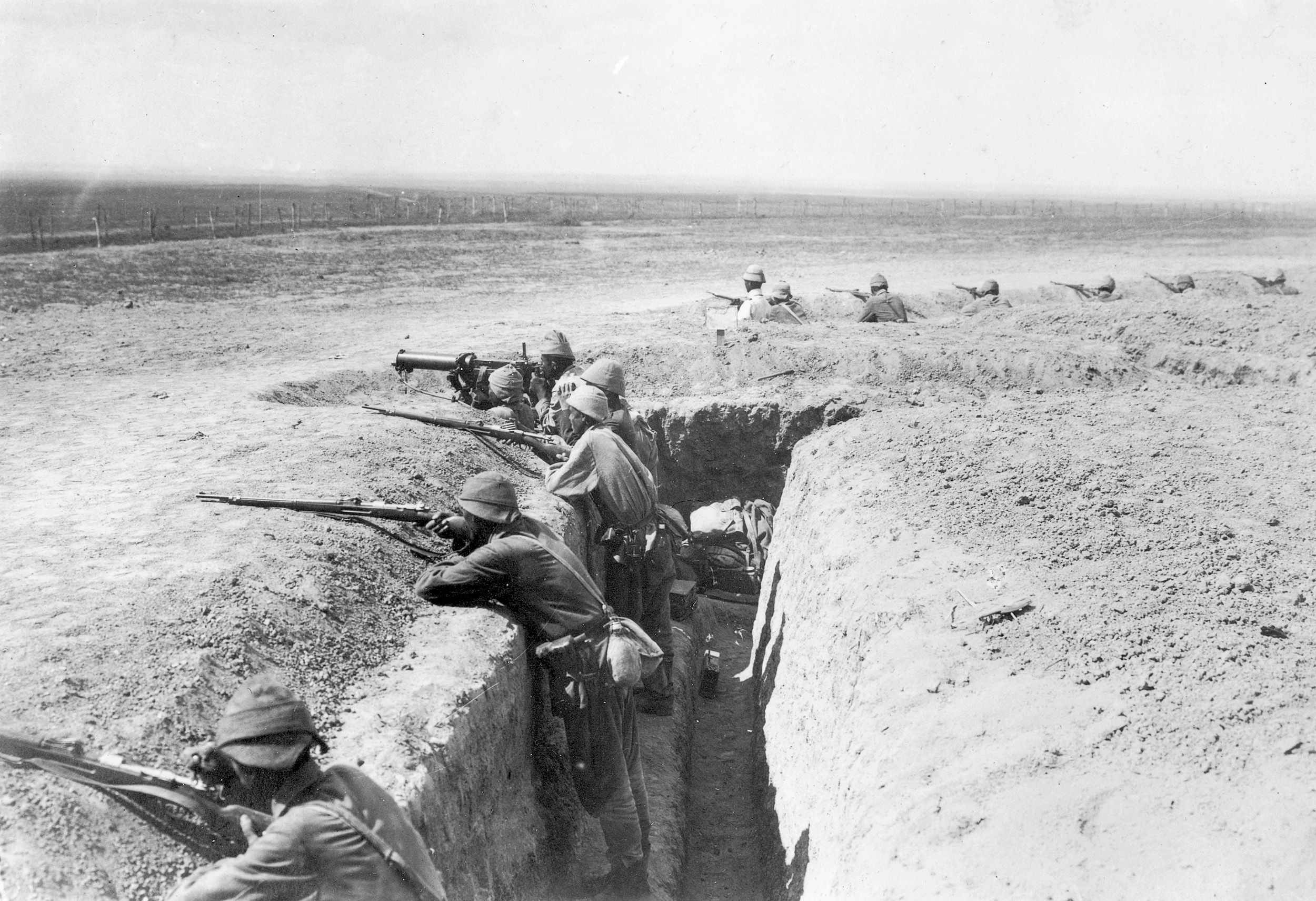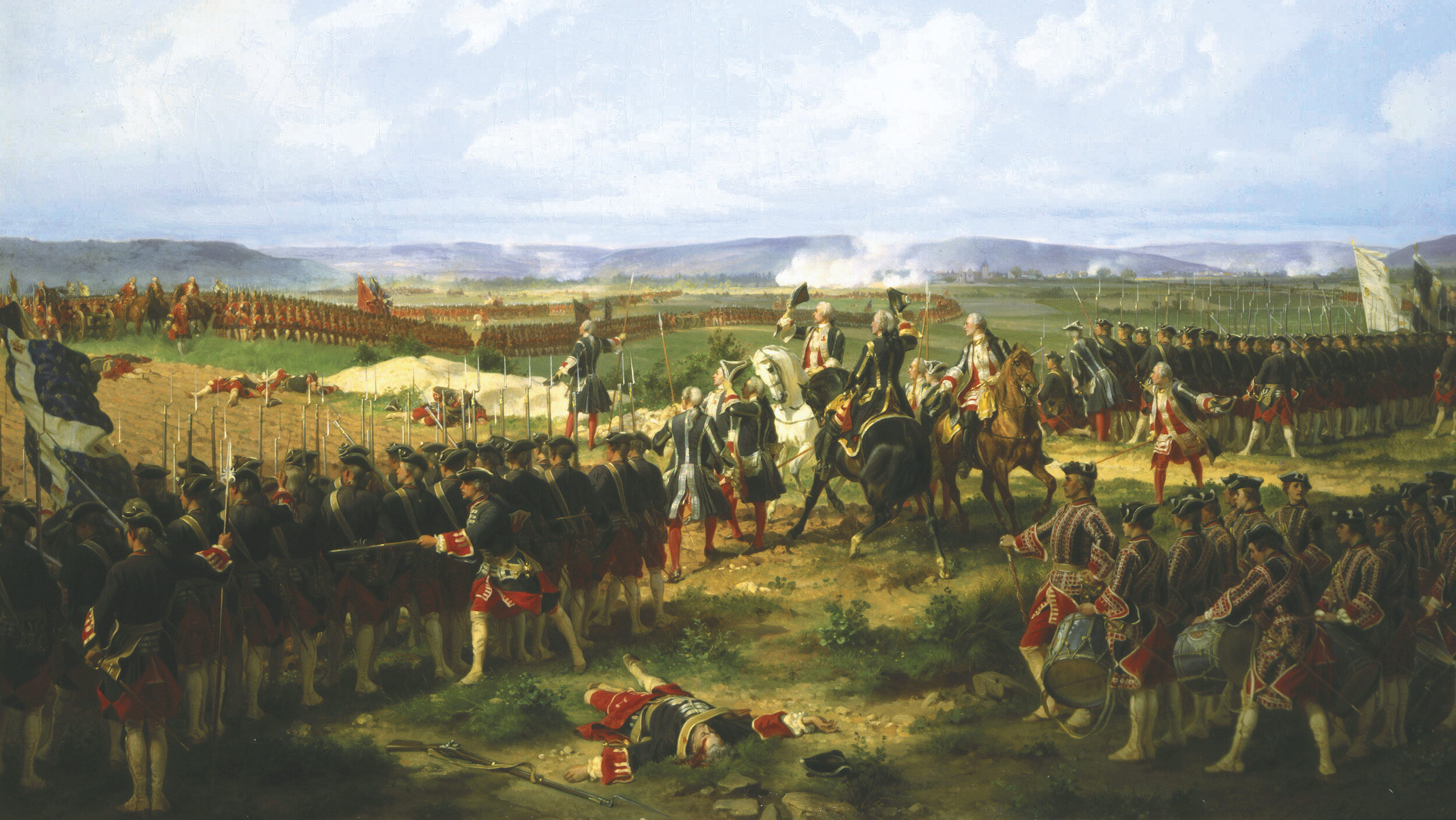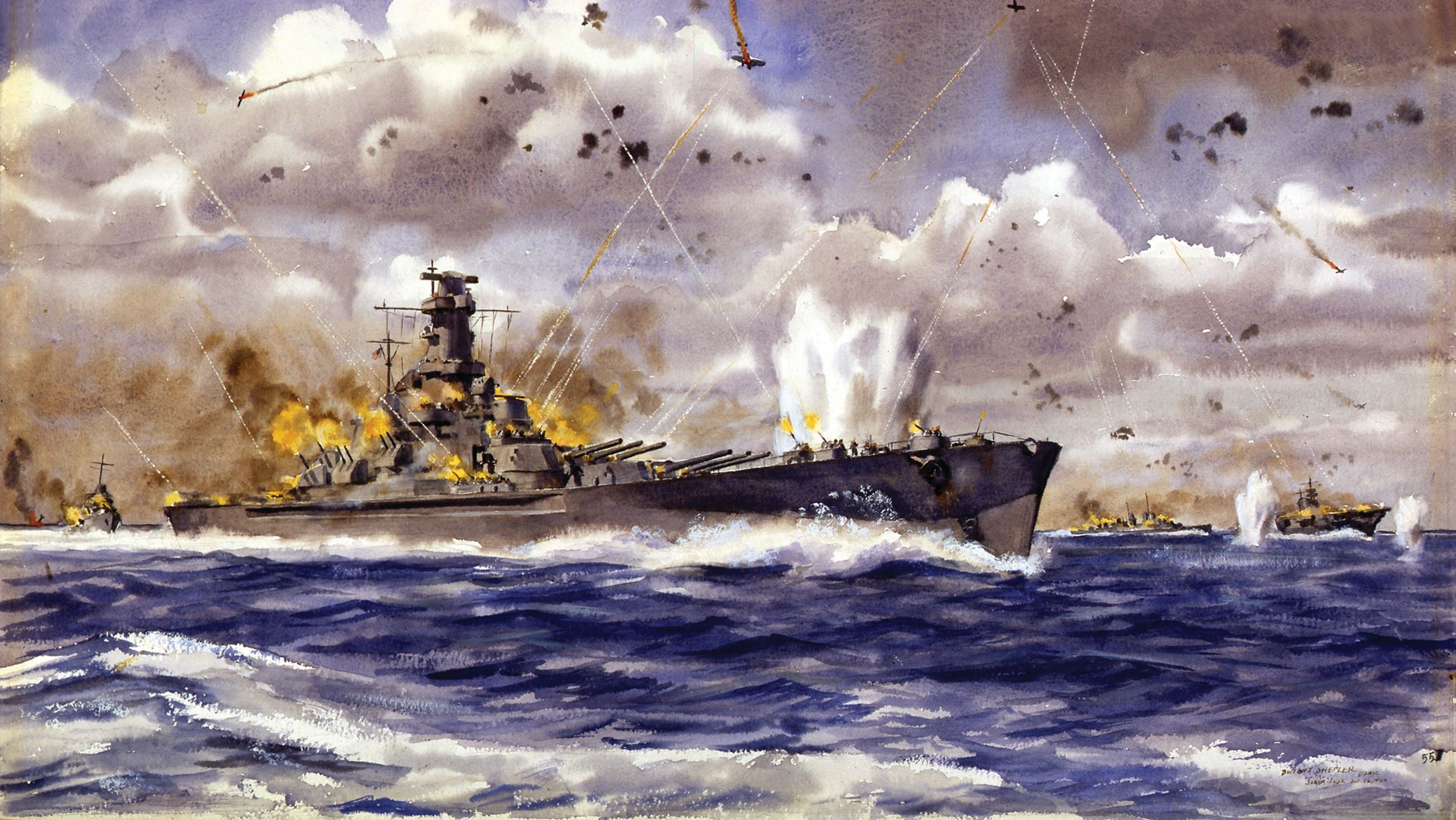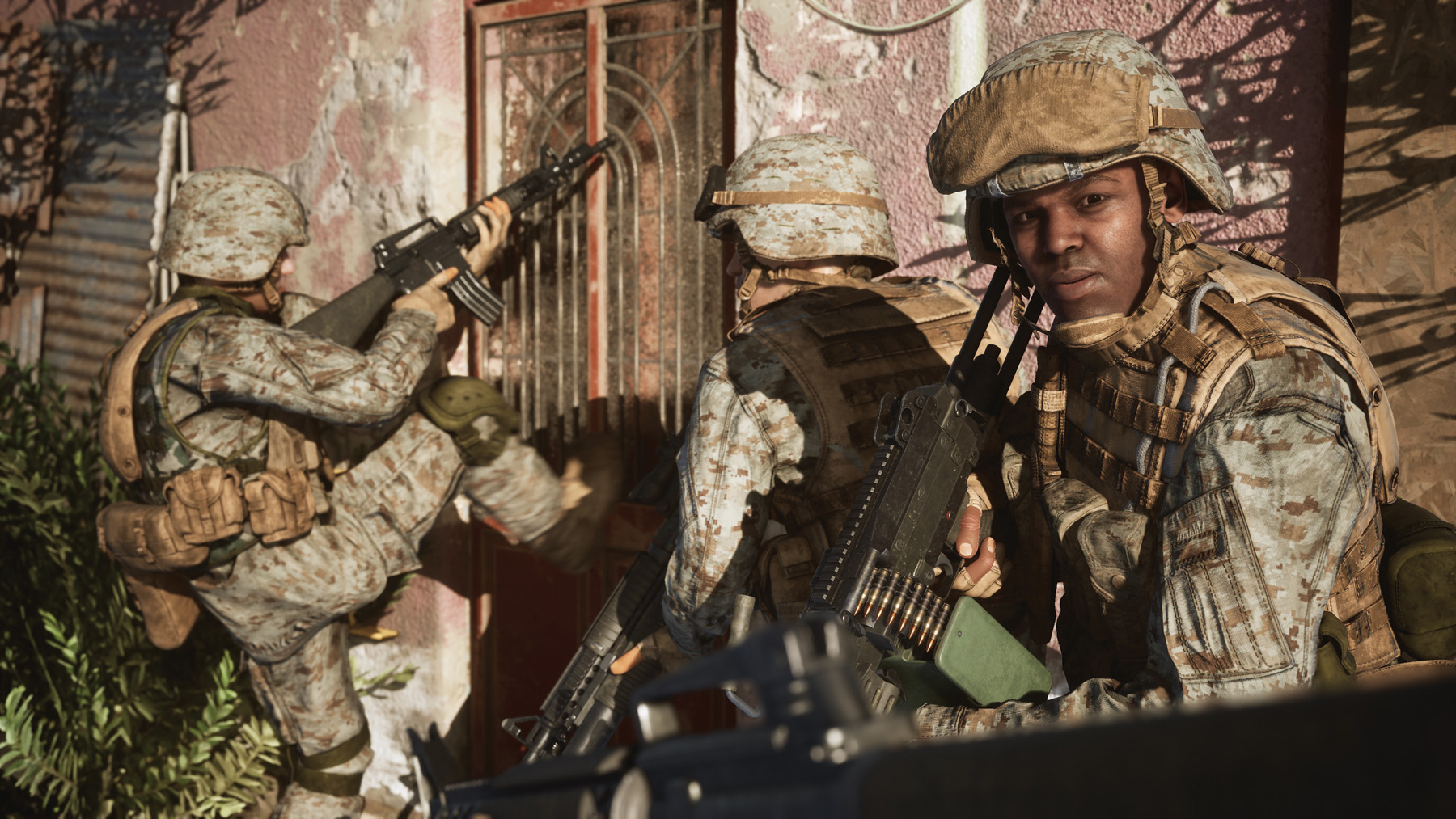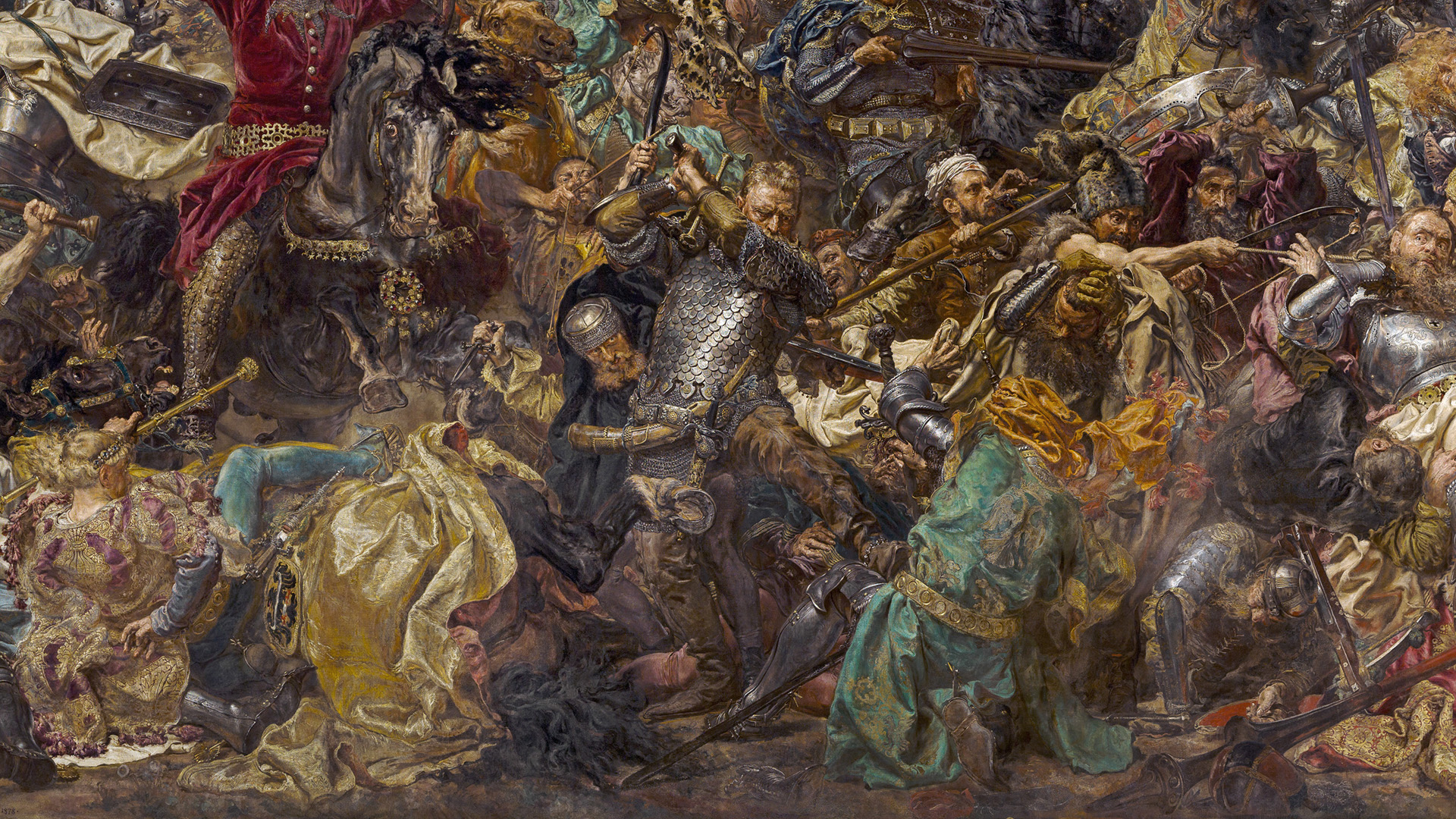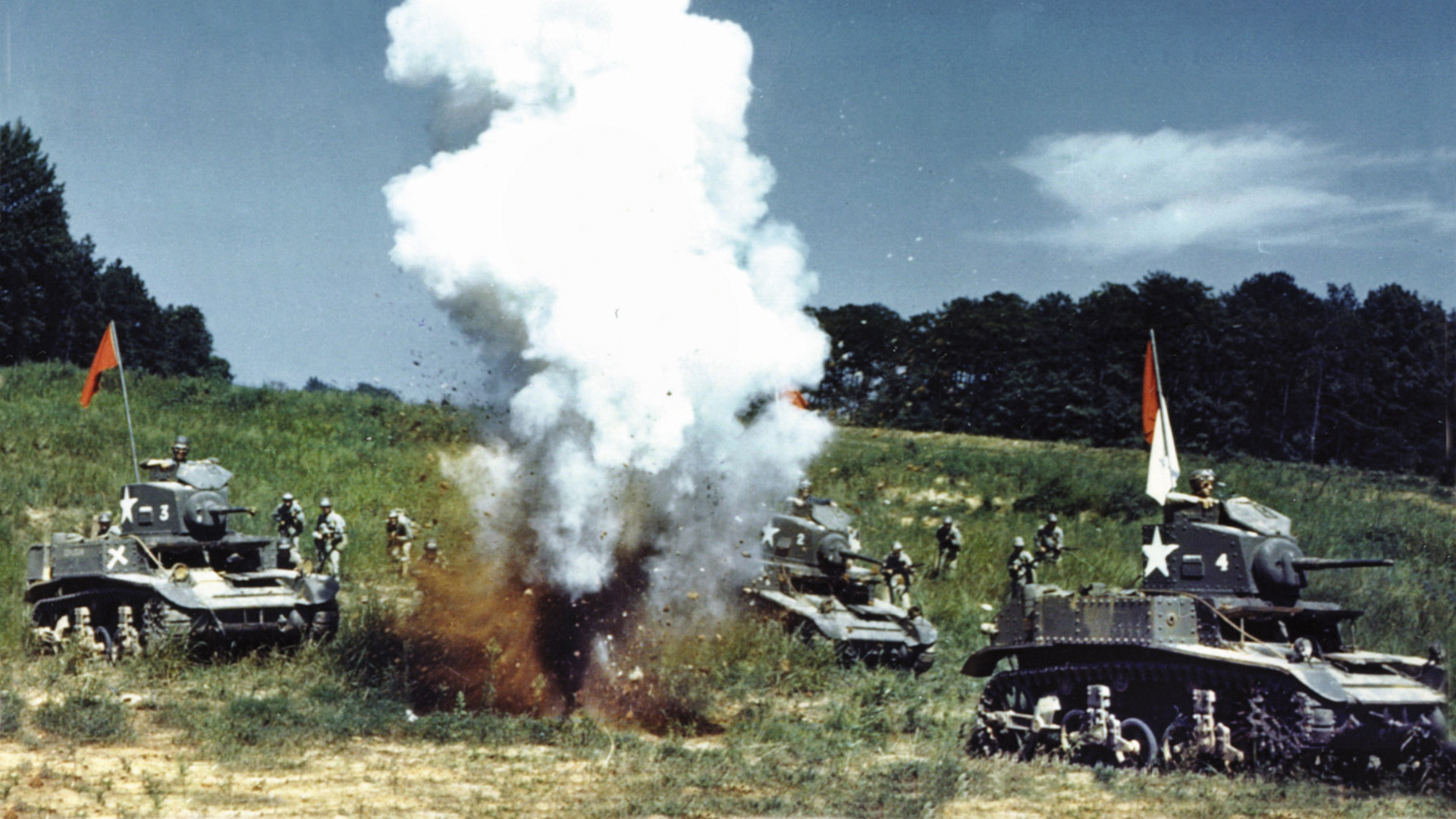By Robert Heege
In the second week of January 1842, a British lookout standing watch on the ramparts of the old walled city of Jalalabad was suddenly confronted with an alarming sight. Peering out over the walls of the ancient Afghan fortress, he was amazed to see a lone rider far off in the distance, slowly making his way across the barren plain in front of the city.
As the figure drew nearer, the lookout could clearly see that the rider was slumping in the saddle and that the horse, too, appeared to be in great distress. Realizing that both horse and rider were on their last legs, the lookout raised the alarm and a cavalry patrol was quickly sent out to bring them in. It was then they learned the awful, appalling truth: that a wounded man on a wounded horse was all that was left of a proud British Army of over 5,000 men and 12,000 camp followers.
A Rattling of Sabers
The seeds for this disaster had actually been sown some years before, as part of the Victorian sideshow of political intrigue that Kipling would later dub “The Great Game.” Far from the romanticized chess match it was later made out to be, the “game” was a 19th-century version of the Cold War, pitting the British Empire against an equally expansionist Czarist Russia and her long-cherished territorial ambitions in Central Asia and beyond.
In the decades that followed the defeat of Napoleon in 1815, the Russian Bear had greedily resumed her age-old habit of nibbling away at the borders of her regional neighbors. So much so that, by the 1830s, the Romanovs were masters of the Caucasus, and a Russian presence had been firmly established as far south as the eastern shore of the Caspian Sea. From there, the Czar and his ministers began to look with hungry eyes toward the oasis cities of the Central Asian plains—Khiva, Merv, and Bokhara—to Tashkent and fabled Samarkand, and to the ancient land of Persia and the warm-water ports of the Persian Gulf. This put them in direct conflict with one of the cornerstones of British foreign policy, for each time the Russians managed to extend their sphere of influence in Central Asia, whether through diplomatic guile or outright territorial conquest, Her Majesty’s government became ever more convinced that their eventual goal would be British India.
By then, protecting India, the “Jewel in the Crown,” had become something of an obsession for the British, and it was no coincidence that both they and the Russians were soon embarked upon rival campaigns to assiduously court the Shah of Persia. Like opposing players on a chessboard, their respective governments set up competing diplomatic missions in Teheran, the Persian capital, from which, despite the usual polite formalities, the two sides continued to eye each other warily.
Simmering tensions came to a boil when Russian military “advisers” backed Mohammed Shah’s claims to Herat, just across Persia’s eastern border in northwest Afghanistan, and assisted the Persians in an attempt to seize the city in November 1837. Fortunately, Yar Mohammed, the Vizier of Herat, had an “adviser” of his own in the form of an English serving officer, Lieutenant Eldred Pottinger. Originally, Pottinger had been conducting a clandestine intelligence-gathering operation in the area on behalf of the political service. Convinced that it would not be long before his true identity was discovered, he had abandoned his disguise and offered his services to the Heratis. It was a shrewd move. Not only did Pottinger manage to keep his head, but he was offered command of Herat’s defenses, which he accepted, and successfully helped the Afghans to fend off numerous attacks. It was then that Mohammed Shah, eager to see the campaign’s progress for himself, ordered the royal caravan assembled and headed east.
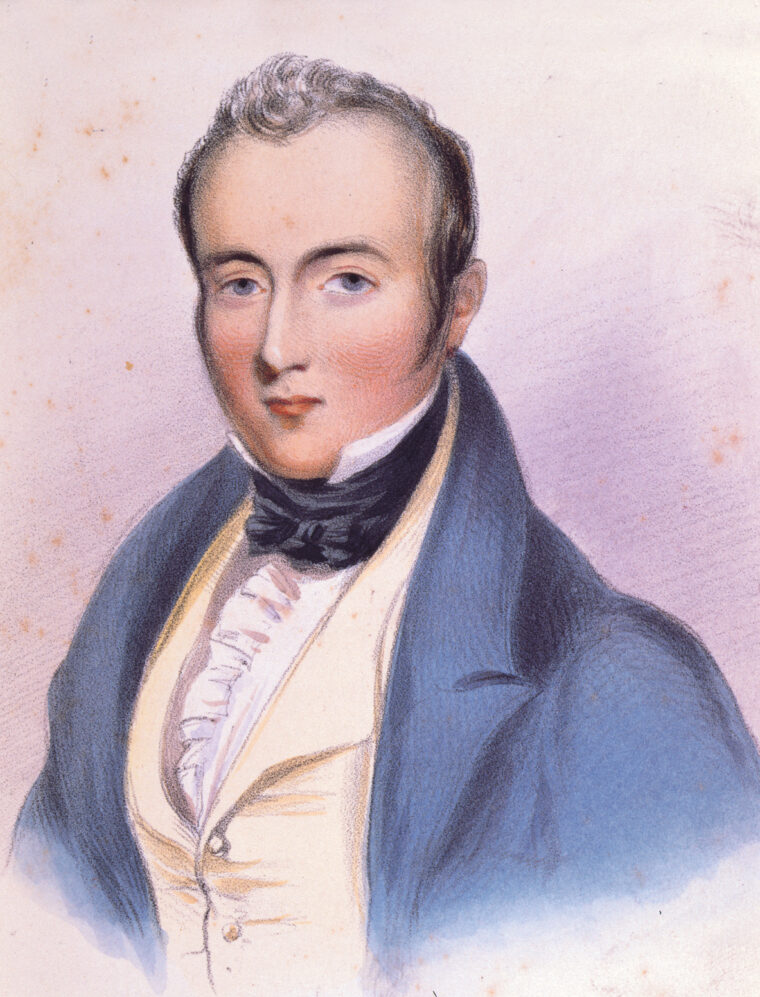
Russia and Britain Try to Woo Mohammed Shah
At this time, the British Mission in Teheran dispatched Major Henry Rawlinson to ride out alone toward the Afghan border to locate the Shah’s encampment. He was very nearly there when he saw four uniformed horsemen riding up ahead of him in the distance. Galloping up to them, he was startled to find himself in the company of a Russian officer and his Cossack escort. After a militarily correct, but decidedly tense, exchange (in which Rawlinson tried using French, English, and Persian to communicate with the Russians, with little apparent success), Rawlinson was given to understand that the Russians were also interested in locating and arranging a parley with the Shah and had come bearing gifts in the bargain. Sensing a certain evasiveness in his opposite number, Rawlinson became convinced that the Russians had something to hide. The sharing of pipe tobacco and some forced attempts at soldierly bonhomie were not enough to allay these suspicions, and after a while an uneasy Rawlinson continued on his way.
Upon reaching the Shah’s encampment near Meshed, Rawlinson was granted an audience with the Persian ruler. He was informed that the Russian officer (whose name turned out to be Captain Ivan Victorovich Vitkevich) had only just left the encampment after requesting permission to travel through the Shah’s realm under a grant of safe conduct. Their intended destination was Kabul, in neighboring Afghanistan. The gifts they carried with them were for no less a personage than Dost Mohammed, the Emir of Afghanistan. As an emir, or prince, Dost Mohammed was the closest thing to a Head of State that existed in what was, in essence, a fractious, chaotic collection of mountain passes, isolated oases, and feuding clans masquerading as a nation.
Rawlinson was still reacting to this startling bit of news when Captain Vitkevich and his Cossacks came riding back into Mohammed Shah’s camp. Apparently, the wily Russian had been bluffing, and was not only fluent in French but also spoke excellent Turkish and Persian as well. After a brief but cordial round of diplomatic goading that greatly amused the Shah, Rawlinson excused himself politely, mounted his horse, and rode as fast as he could the 700 miles back to the British Mission in Teheran to alert his superiors. In no time, teeth were chattering from one end of British India to the other, and soon the news had traveled to London as well.
‘Bokhara Burnes’ Beats Russia to Dost Mohammed
When the redoubtable Vitkevich managed to reach Kabul, entering the Afghan capital on December 19, 1837, he was astonished to discover that a Scotsman had already beaten him to it. Some years earlier, an East India Company adventurer by the name of Alexander Burnes had donned native garb and set off from India to explore this most inhospitable of regions for the Crown. For two years, from December 1831 through January 1833, Burnes’ travels took him through Kashmir, Punjab, Persia, and Central Asia—including Afghanistan. Most famously, he had managed to gain entrance to the closed city of Bokhara in the land of the Uzbeks—closed, that is, to all but those faithful to Allah. As a Christian “infidel” and a ferangi, or foreigner, Burnes might easily have paid for this daring feat with his head had his presence within the city’s walls been discovered by the average Bokharan. His luck held, though, and for this bit of romantic derring-do he was honored by King William IV and celebrated all over England as “Bokhara Burnes.”
Fortunately for the British, Burnes had visited Kabul en route to Bokhara. There, he soon came to the attention of Dost Mohammed. In fact, the two had become such fast friends that the Emir actually offered Burnes the command of his entire army. Anxious to press on to Bokhara, Burnes had respectfully declined the offer. Nevertheless, the two men had parted as trusted friends. Realizing a potential foreign policy coup when they saw one, British politicos in India decided to send Burnes back to Dost Mohammed’s court in November 1836 in the hopes that a treaty might be brokered with him. After an arduous 10-month journey, on September 20, 1837 the peripatetic Burnes re-entered Kabul, where he was warmly received as an honored guest of the Emir.
A popular and able ruler who had already overcome the objections of two older brothers on his path to power, Dost Mohammed fervently hoped to bring some measure of stability to his country. He was eager to reach some kind of accommodation with the British, but the Emir had a bone in his throat. Apart from the fact that the Persian Army continued to besiege Herat, Peshawar, another strategically important city, had been lost in a border war with Punjab in May 1834. Already well on its way to becoming a British puppet, Punjab was a nominally independent Princely State in northern India backed by powerful friends. While Dost Mohammed desperately wanted Peshawar back, he was loath to incur the enmity of Punjab’s British allies, who were already in full control of a large swath of Punjabi territory.
Adding to this sore was the fact that the deposed former ruler of Afghanistan, Shah Shuja, was currently in his 20th year in exile, living as a political refugee in, of all places, the Punjab. There, as the honored guest of the Punjabi ruler, Ranjit Singh, and later, as a pensioner of the British, he whiled away the hours scheming to regain his throne and pleading his case to anyone who would listen. Taking a realistic look at the political calculus of the day, Dost Mohammed had made tentative overtures to the Russians in secret, starting in 1835, in the hopes of obtaining allies of his own. It was in response to these entreaties that the Russian government dispatched Vitkevich and his Cossacks to Kabul two years later, in the fall of 1837.
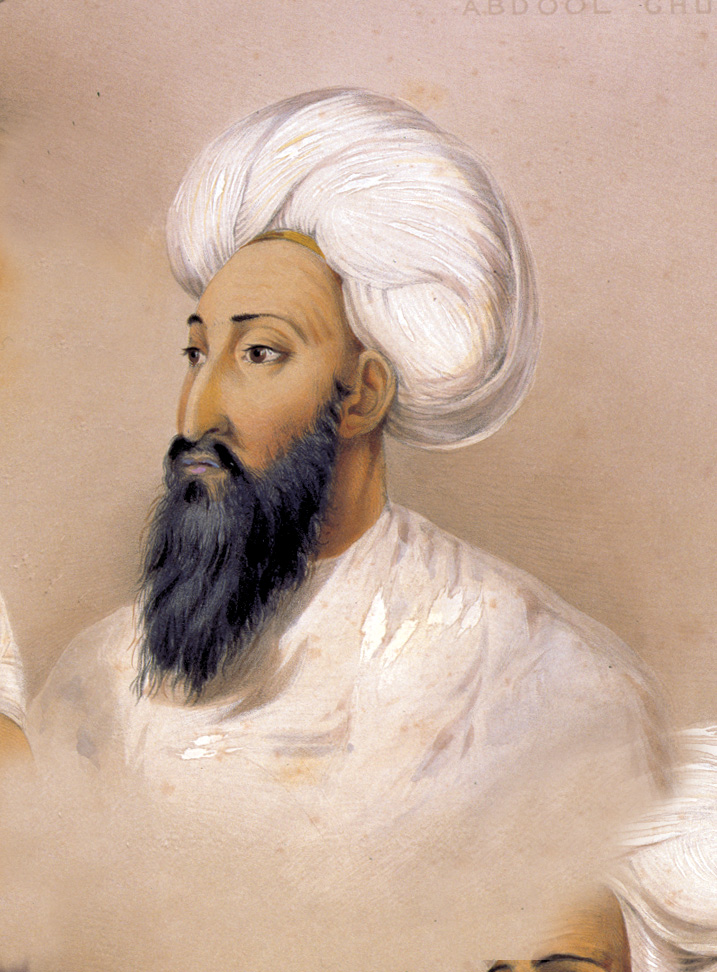
Sitting down to a Christmas dinner of cat-and-mouse as a guest of “Bokhara” Burnes, Vitkevich must have felt his mission an utter failure. The following January, fate intervened by dropping a ripe plum into his lap in the form of a stridently threatening letter sent to Dost Mohammed by Lord Auckland, the British Governor-General of India. The letter, more like a mailed fist than a diplomatic message, demanded that Dost Mohammed relinquish at once all further claims to the province of Peshawar, immediately cease contact with the Russians, and desist from any similar “provocations” in future.
Although stunned by the aggressive tone of the ultimatum, the Emir was nonetheless resolved to avoid at all costs the humiliating loss of face that such an abject capitulation would bring. As tensions mounted, Burnes’ position in Kabul became more and more untenable. In April 1838, he was compelled to leave the city. Vitkevich, no doubt, must have been beside himself with joy, but his diplomatic triumph would prove to be decidedly short-lived. The decisive move in this dangerous game would belong to the British.
At Herat, as the Persians continued their lachrymose siege of the city, Count Ivan Simonich, the head of the Russian Mission in Teheran, arrived to take personal control of the Shah’s forces, armed with plans for a renewed assault. Remarkably, Pottinger and the Herati army managed to beat back this attack as well. Reacting to this latest Russo-Persian gambit, an apoplectic Lord Auckland sent the warships HMS Semiramis and HMS Hugh Lindsay to the Persian Gulf. Royal Marines landed at Kharg Island, and the Shah was informed that continuing to besiege Herat would mean war with Great Britain. On September 9, 1838, with great haste and little fanfare, the Shah returned to Teheran. The siege of Herat was over.
In London, Lord Palmerston, the British Foreign Secretary, broke out the big guns in diplomatic circles as well, putting the screws to the Czar’s government. In short order, the Czar disavowed the actions of his subordinates, declaring that they had acted without authorization. His Foreign Minister, Count Nesselrode, was dismissed and Count Simonich was recalled to St. Petersburg in disgrace, as was the luckless Vitkevich, who committed suicide later that same year. As for Britannia’s heroes of the day, Pottinger received the Order of the Bath, while the intrepid “Bokhara” Burnes was knighted by his grateful new sovereign, a shy 17-year-old who had only just come to the throne following the death of her Uncle William. Her name was Victoria. Still in his twenties, Burnes was once again the toast of the nation.
With Herat safe from any further depredations, the Shah of Shahs high-tailing it back to Persia with his hapless army in tow, and the Russian government falling over itself to placate the graybeards of Whitehall, the entire episode might have ended then and there in a triumph of British realpolitik but for one man’s outsized sense of pride. Although the crisis had ended, back in India Lord Auckland was still seething over Dost Mohammed’s blithe rejection of the British ultimatum the previous January. He was determined to teach the Emir a lesson, and in so doing, to settle the Afghan matter once and for all.
A Lovely Little War
To assist his schemes, Lord Auckland had already enlisted the aid of an ambitious political officer, William Hay Macnaghten. A careerist with a gift for languages, Macnaghten presented his Lordship with a plan in May 1838 that was as devious as it was clever. Together, they would attempt to persuade Ranjit Singh, the Maharajah of Punjab, to invade Afghanistan with his army and topple Dost Mohammed from his throne. Afghanistan’s former ruler, the celebrated refugee Shah Shuja, would then be restored to power and the British would have two regional puppet-kings for the price of one. In return for his restoration to the throne, Shah Shuja would sign away all rights and claims to the province of Peshawar forevermore.
Intrigued by the plan and eager to secure his eastern borders from any future Afghan incursions, Ranjit Singh was only too happy to join in the conspiracy and assist the British, up to a point. The wily Sikh resisted all blandishments when it came to committing his troops to any future military campaign. Accordingly, in June 1838—nearly three months before the British landings at Kharg Island—he duly signed an agreement with Shuja and his newly minted British allies, pledging to support Shuja in his renewed bid for power. For his part, Shuja obligingly relinquished any future claims to Peshawar, but nowhere in the document was any specific declaration made on the part of Ranjit Singh regarding the use of Punjabi troops in the event of future hostilities. Should it come down to bayonets, as in all likelihood it would, Shuja and his principal benefactors would be on their own once they set foot in Afghanistan.
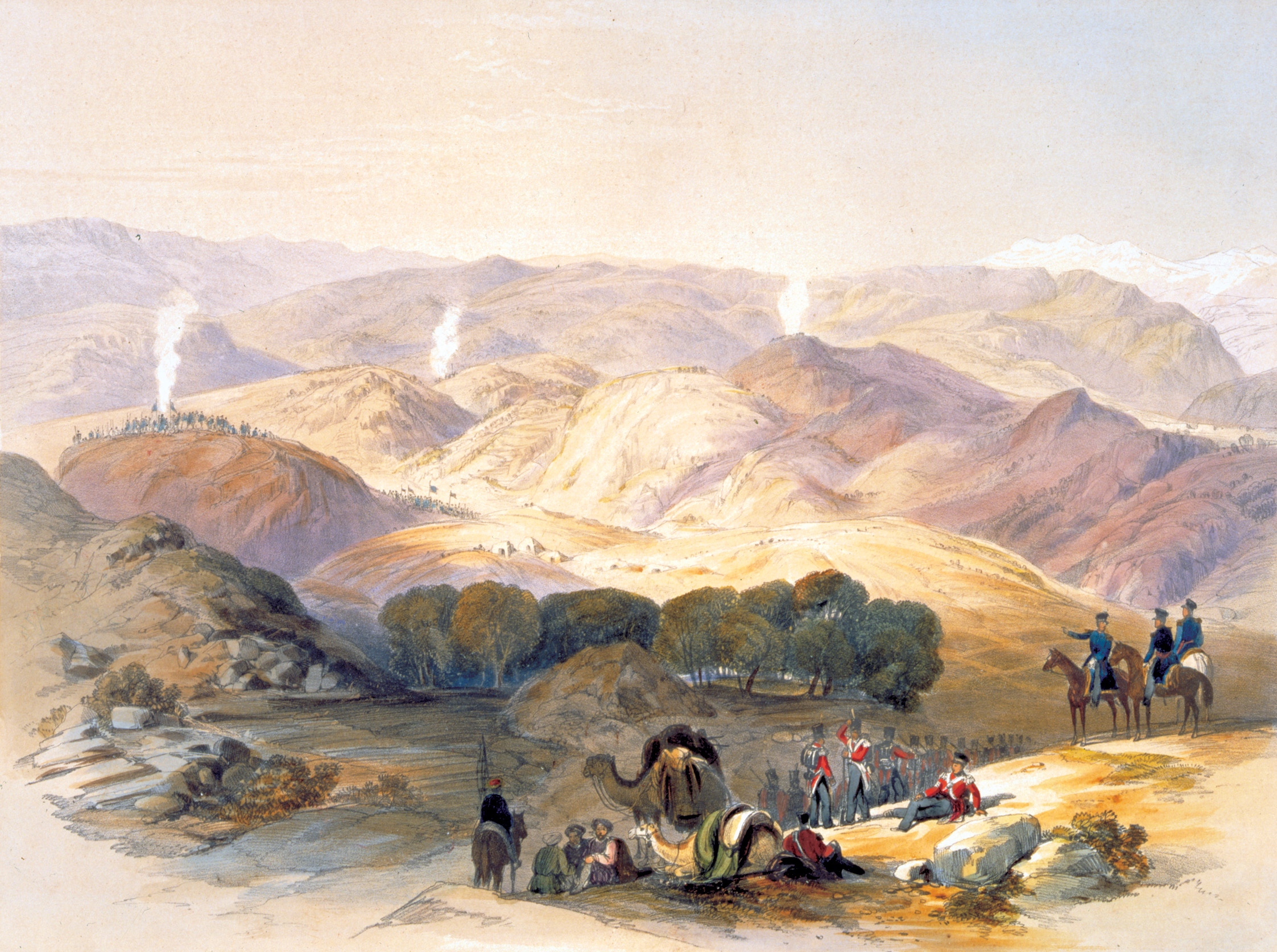
The Simla Manifesto
On October 1, 1838, less than a month after the collapse of the ill-fated Russo-Persian adventure outside the gates of Herat, Lord Auckland officially issued what became known as the Simla Manifesto. Drafted over the strenuous objections of Sir Alexander (“Bokhara”) Burnes, the document severely upbraided Dost Mohammed for consorting with the Russians and declared that by having done so, he had revealed himself to be an enemy of the Crown, a threat to British interests in the region that could no longer be countenanced.
With great zeal and unseemly haste, Lord Auckland cobbled together a fighting force suitable to the kind of punitive expedition he had in mind. To command it, he chose Lt. Gen. Sir John Keane, Commander-in-Chief of the Bombay Army, a no-nonsense veteran, but he also made sure that his confidant, Macnaghten, seconded the new army as special envoy to the court of the once and future Shah Shuja. Also ordered into the field was Sir Alexander Burnes, now a lieutenant colonel, to serve, however reluctantly, as Macnaghten’s deputy. Christened “The Army of the Indus,” the force was composed of 5,600 men of the Bombay Army, 9,500 British and Indian troops of the Bengal Army under Maj. Gen. Sir Willoughby Cotton, and an additional 6,000 levies made up mostly of Afghans loyal to Shah Shuja. Altogether, there were nine regiments of foot (infantry), a regiment of Queen’s Cavalry (the 16th Lancers), and two full companies of mounted horsemen from “John’s Company,” a kind of light cavalry in the direct employ of the East India Company. The plan called for the troops of the Bombay Army to be ferried by ship to the mouth of the Indus River in Sind. Once there, they would link up with the Bengal Army marching south-southwest from Punjab to meet them.
At Ferozepore in the Punjab, the assembled forces of the Bengal Army, complete with engineers, artillery, and several military bands, paraded before Lord Auckland and Ranjit Singh in a great pageant before setting off to conquer Afghanistan. Following in their wake was an enormous baggage train of camels carrying everything from ammunition and foodstuffs to the officers’ tobacco, water pipes, and prized cigars. There were 600 native stretcher-bearers for every regiment; cooks, laundrymen, and water carriers for every platoon; and grooms and blacksmiths for the cavalrymen. In addition, each officer took along his personal allotment of 10 servants, and the servants’ families as well. Altogether, this second “army,” including a veritable legion of prostitutes, numbered in the tens of thousands.
With its ranks thus swollen by this horde of camp followers, the three divided commands that made up the Army of the Indus slowly lumbered along toward the Afghan border. Because Ranjit Singh, ever mindful of appearances, was loath to allow such a mighty host to openly use Punjabi territory as a base of operations for the invasion of his neighbors, the British were denied the traditional route into Afghanistan via the Khyber Pass. As a result, General Keane was compelled to order the respective elements of his two-pronged spearhead to proceed to the banks of their namesake, the Indus River, effect a crossing, and rendezvous shortly thereafter. Cotton’s Bengal Army was first to arrive at the agreed-upon crossing point. Once across the river, they marched southward through Sind, where Shuja had a few old scores to settle with his erstwhile vassals, the local emirs. Propped up by an entire British army, Shuja easily extracted renewed oaths of eternal friendship and loyalty from the Sindi rulers. Keane’s Bombay army, meanwhile, was making its way up from the river’s mouth where it had disembarked. Unwilling to wait for them, the Bengal contingent continued on its way.
Burnes Bribes His Way Through the Bolan Pass
On they marched until, in the spring of 1839, they arrived at the Bolan Pass, a mountainous, 55-mile-long killing zone wending its way through the wilds of Baluchistan. Here, Lord Auckland’s insistence that Burnes, the Orientalist, accompany the expedition paid off spectacularly. By means of a few well-placed bribes, “Bokhara” Burnes was not only able to buy off the murderous Baluchi tribesmen and ensure a safe passage through their territory, he was also able to convince them, again, for a price, to part with several thousand of their prized sheep, thus reprovisioning the already-hungry army. At Quetta, just northwest of the Bolan Pass, Keane’s Bombay Army finally caught up with Cotton’s troops. The divided forces of the Army of the Indus were at last able to link up on April 4, 1839.
As the troops, now 21,000 strong, prepared to move into Afghanistan proper, the Baluchi chieftains, whom Burnes had made rich, went out of their way to advise him that the overwhelming majority of Afghans held Dost Mohammed in high esteem. They had detested Shah Shuja, they warned, and would not look kindly upon outsiders who would seek to reimpose his unpopular rule upon them. It was an early warning that would go woefully unheeded.
On April 25, 1839, after an exhausting trek through the Kojuk Pass, the army reached the outskirts of Kandahar, Afghanistan’s fabled southern capital. Upon hearing of the invading force’s arrival in the vicinity, Kandahar’s ruler, one of Dost Mohammed’s brothers, wisely fled for his life toward Kabul, and the city was taken on May 5 without so much as a shot being fired. The British saw to it that a great show was made of having Shah Shuja ride triumphantly into the city at the head of his 600-strong Afghan cohort. For their part, the Kandaharis shrewdly turned out to cheer and throw flowers in the path of their returning Caesar, but later, when Shuja and a jubilant Macnaghten held a ceremonial durbar (pageant) just outside the city to celebrate Shuja’s return, “Bokhara” Burnes was quick to point out that the military bands and the soldiers parading in front of the reviewing stand were, after all, their own men. Far more telling was the fact that, in spite of the ostensibly friendly greeting their armed host had initially received upon entering the city, the number of Kandaharis that bothered to attend the festivities was decidedly small.
The Attack on Ghazni
Moving north toward Kabul, the army continued its practice of buying off the various chieftains and tribes it encountered until June 25, when it came to the city of Ghazni. Unlike Kandahar, Ghazni was a true fortress that sat upon a mountaintop. In addition to this natural defensive barrier, the city was well fortified, entirely surrounded by high walls that measured 60 feet thick. The British realized that although they still had plenty of tobacco and cigars, they had neglected to bring any heavy siege guns with them, having left them behind with an occupation force in Kandahar.
Still, their luck continued to hold. Incredibly, a Kashmiri in the service of “Bokhara” Burnes named Mohan Lal knew Ghazni well and had contacts within the city. Lal proved to be an excellent spy, and through his intelligence sources inside Ghazni, the British learned that all but one of the city’s gates had been walled up from the inside by its defenders. At nightfall, as a fierce storm blew up, General Keane ordered a series of diversionary attacks on the other gates that were soon drawing the bulk of the Afghan fire. Simultaneously, a party of sappers that included Lieutenant Henry Durand of the Bengal Engineers successfully managed to place 300 pounds of explosive black powder charges in front of the one true gate without their presence being discovered. After somehow lighting the fuse in spite of the wind and rain, they were able to scamper away to safety undetected just before the gate was literally blown to pieces.
With the air still thick with the gray-blue pall of spent gunpowder, a British storming party led by a Captain Dennie burst through the gap and rammed its way into Ghazni. Amid the utter chaos of those first few moments, they were on their own inside the city. Accounts vary as to what happened next. Most reports of the day maintain that in the confusion of battle, a bugler with the support troops named Wilson had become so unnerved that instead of sounding the attack, he had actually begun blowing “Retreat” instead. Other, more modern scholars insist that acting Brigadier Robert Sale, unable to see through the smoke and convinced that the gate’s destruction must have left an insurmountable pile of rubble in its wake, had ordered Wilson to sound the retreat and that it was the bugler, whose grasp of the situation in those critical moments was apparently superior to that of his commander, who took it upon himself to resume sounding the attack. In any event, the British were soon pouring through the breach in force, and in less than an hour Ghazni was theirs, at a cost of 17 dead. Before all resistance had ended, the Afghans had lost over 1,200, including 50 captives who were beheaded by the vengeful Shah Shuja’s executioners before the British could intervene.
Kabul Falls Like a Ripe Fig
There at Ghazni, General Keane rested his troops until late June, halting the advance just long enough to give his army sufficient time to relieve the locals of most of their foodstores before setting off again. Less than a week later, after encountering only token resistance, they reached Kabul, the Afghan capital, August 7. To their astonishment and delight, the city, like Kandahar before it, seemed to fall into their laps like a ripe fig. Dost Mohammed was nowhere to be found, and resistance was nil. They should have been more wary. When Shuja, with Macnaghten at his side, entered Kabul, no fair-weather cheers greeted him this time. Instead, the sullen, gloomy crowds just stood there, glaring silently as the procession went by. A short time later, Nawar Jubbar Khan, the now-deposed vizier of Kabul, lashed out at “Bokhara” Burnes with a stinging rebuke: “You have brought him [Shuja] by your money and your arms into Afghanistan. Leave him now with us and let him rule over us if he can.” It was yet another ominous harbinger that nobody seemed to notice. From London to Lahore the Army of the Indus was lionized. William Macnaghten received word that young Queen Victoria had made him a baronet. Keane was created an earl no less, Lord Keane of Ghazni.
With Shah Shuja restored to his throne in Kabul and the city itself almost unnaturally quiet, General Keane soon tired of his role as a glorified Praetorian Guard and decamped for India in November 1839, taking most of his troops with him. General Cotton followed suit shortly thereafter. As a result, Sir William Macnaghten, the newly minted baronet, became the man in charge in Kabul. Military decisions there were henceforth subordinate to his political judgments. After a while, the remaining occupation forces became so lulled by a false sense of security that they decided to abandon the cheek-by-jowl confines of Kabul’s Bala Hissar Fortress in favor of an airy cantonment that was constructed on the plain about a mile outside the city. Lush and picturesque, with orchards and polo fields, the cantonment was nevertheless virtually indefensible from a military point of view. Foolishly, it was decided to house the Commissariat and the foodstores in separate buildings that lay well beyond the perimeter of the cantonment. What’s more, the plain on which they chose to build the cantonment was laced with irrigation ditches, providing any would-be attacker with a system of ready-made trenches.
To make matters worse, the plain on which the cantonment was erected was surrounded by hills. What should have been even more alarming was the fact that the hills were dotted with old ruins, perfect for snooping and sniping. The whole effect was like living in a giant punchbowl with a thousand watchful eyes staring down. Still, the cricket matches, horse races, and blissful morning and afternoon rides continued uninterrupted. For their part, the merchants of Kabul were only too anxious to part with their wares in exchange for the British gold they coveted, and so it went for a time. Ensconced there, amid all the comforts of home, some of the officers even sent for their wives to join them. Others, like “Bokhara” Burnes, simply looked to the more obliging of the local women, though the seething resentment of their fathers, brothers, and scores of cuckolded husbands was often only too palpable. Dost Mohammed meanwhile had suddenly resurfaced and begun conducting guerrilla attacks north of the capital.
As far as Macnaghten was concerned, however, life in the cantonment was nothing but rosy. This conviction was underscored when Dost Mohammed inexplicably surrendered personally to Macnaghten on November 3, 1840, as the latter was out among the orchards, in the midst of his evening ride. Once his old nemesis, Dost Mohammed, was sent into exile in India, Macnaghten’s hubris and brimming confidence might almost be forgiven. Still, there were other voices. Major Rawlinson, now posted to Kandahar, could see for himself that the rising tide of discontent among the Afghan masses was about to boil over. Blithely raising taxes to pay for his sybaritic tastes, Shuja seemed determined to remind his people of why they had toppled him from power in the first place. From the countryside north of the capital, Eldred Pottinger, the hero of Herat, also sent several ominous messages to Macnaghten, warning him that they were all living in a fool’s paradise. Eventually, despite Macnaghten’s assurances, a feeling of uneasiness begin to infiltrate the cantonment. Despite this, nothing whatever was done about it.
A whole year passed. Although Macnaghten was not averse to the occasional show of force in his dealings with the Afghans—he was, after all, the architect of the entire enterprise—the politician in him was always far more fond of using the carrot than the stick. Like the Romans 14 centuries before, he preferred to bribe and buy off the barbarians at the gates rather than endure the rigors and exertions of girding for battle with them. The once-mighty conquerors had become fat, addicted to pleasure, and fatally complacent.
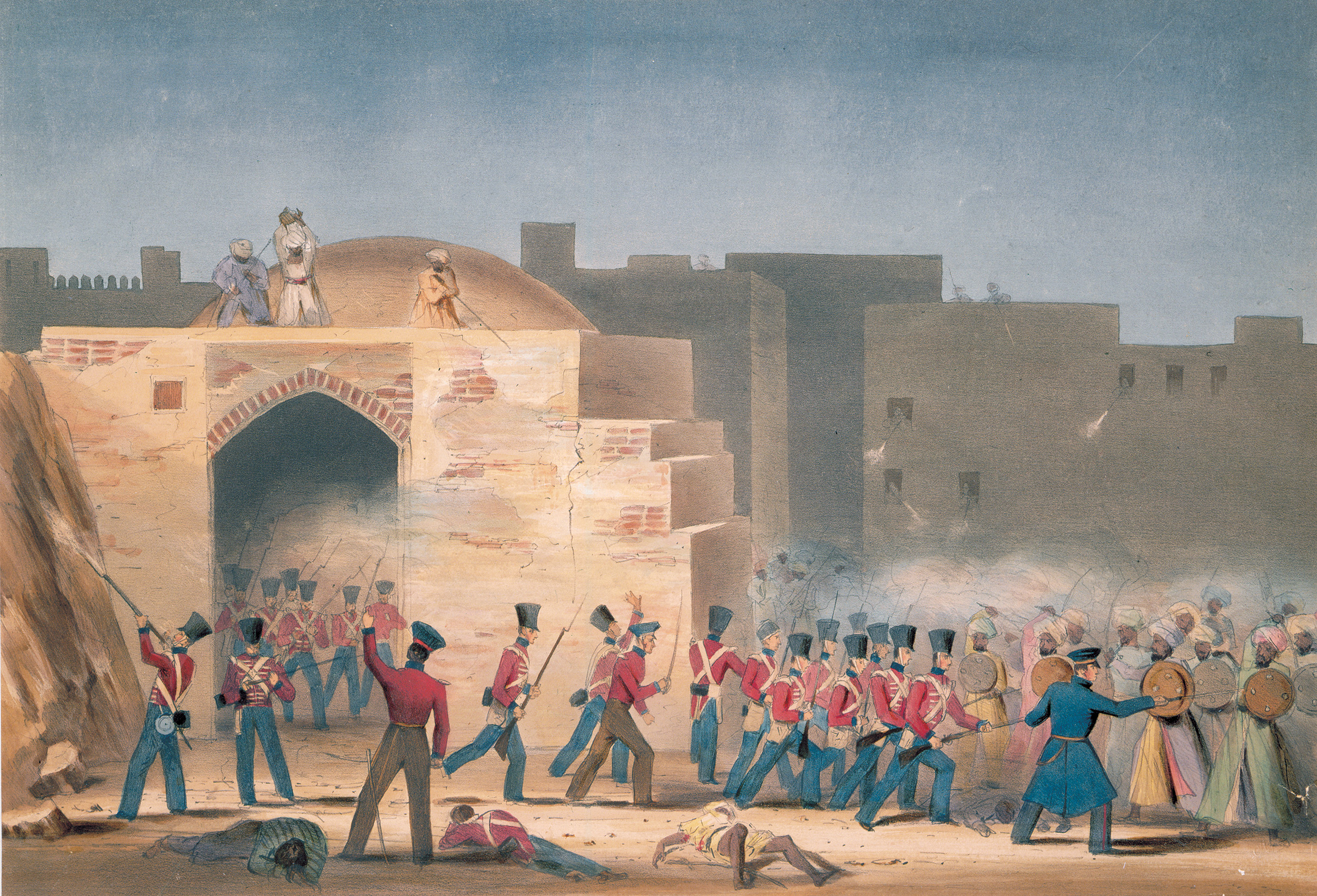
Elphinstone Arrives: The Worst Possible Man for the Job
It was at this critical time, when someone of sound military judgment was needed, that General Keane’s replacement, Maj. Gen. William Elphinstone arrived at Kabul. He was, without a doubt, the worst possible man for the job. A befuddled, gout-ridden 60-year-old who hadn’t seen action in 25 years, he looked like somebody’s aged grandfather—nice enough, but obviously hopelessly incompetent. Because military commissions at this time were regularly handed out to the well connected, and promotions and advancement through the ranks were rarely based on merit, there were a great many gold-braided buffoons serving in the British Army. Nevertheless, it must be said that even among these, Elphinstone was a standout.
Another winter was coming, and with it the snows that would block all of the mountain passes leading back to British territory. Once this occurred, resupply and reinforcement of the cantonment would be impossible. In the event of hostilities, the British—soldiers and civilians alike—would be cut off and on their own, surrounded by a native population that had always cordially detested them and were now becoming more openly bitter and resentful of their continued presence there with each passing day.
Stories began trickling back to the cantonment of attacks on the string of remote British outposts that protected the route back to India. These redoubts were also the cantonment’s only communications link to the outside world. Elphinstone, like Macnaghten, dismissed these reports out of hand as wild rumors and never bothered to investigate further. Even the celebrated “Bokhara” Burnes seemed unable or unwilling to acknowledge the precariousness of their situation. Eschewing even the cantonment, Burnes and several others had actually taken up residence in comfortable houses in Kabul itself. Having resolved to indulge his passion for women and wine in ever-greater quantities, Burnes was confident that his Indian Sepoy bodyguards (and the troops of the cantonment less than two miles away) would always be able to protect him.
Burnes Ignores the Warnings, and Pays for It
On November 1, 1841, the ever resourceful Mohan Lal informed his master that the situation in Kabul was deteriorating rapidly, and that there was talk among the locals of an attack on the house being planned for the following day. Sadly, Burnes, who could boast a more intimate knowledge of the region and its people than almost any other Englishman alive, thoroughly underestimated the seriousness of the threat.
Early the next morning, an ugly mob began forming in front of the house. As the hours passed, their numbers grew larger and more emboldened. There were shouts and insults, and the crowd, their thirst for revenge against the infidel Lothario whetted by rumors of a vast horde of gold hidden within the house, began to riot. Burnes tried to reason with the rioters, to charm the Afghans as he had so many times before, but he’d lost the magic. When that didn’t work, he ordered them to disperse, but they called his bluff and refused to leave. Then he made a fatal mistake. He offered them money. He would give them gold, he said, if only they would go home.
In Burnes’ experience, an Afghan had never met a bribe he didn’t like, but this time the familiar tactic backfired horribly. Why should they settle for a few coins, they thought, when they could have it all? With that, the mob smashed their way into the home of Captain Johnson, who was serving as Shuja’s paymaster, and began stealing the royal treasury. Fortunately, Johnson had opted to spend the night at the cantonment. Desperately trying to control the situation, Burnes ordered the 28 Sepoys of the treasury guard detachment not to fire on the rioters and appealed for calm. Above the roar of the crowd he was even heard offering to reward the rioters if they would guarantee the safety of the others in the house. Suddenly, a shot rang out and William Broadfoot, Burnes’ military secretary, fell dead, the victim of a sniper’s bullet. In a panic, the treasury guards began firing into the crowd, but it was too late to stop them. The mob swarmed over the guards, overwhelming them in a human tidal wave of hate. Surging forward, they forced their way into the garden and set fire to the stables behind Burnes’ residence. Then they stormed the house.
There are conflicting reports of what happened next. Some say that Burnes’ servants offered to roll him up in a carpet and try to smuggle him out of the house, literally under the noses of the rioters, who were already becoming preoccupied with looting everything in sight, and that Burnes refused this ignominy and died fighting on his feet, along with his brother, Lieutenant Charles Burnes, an army surgeon who had the misfortune to be visiting at the time. Others say that Burnes and his brother, disguised in native garb, attempted to escape with the help of an Afghan or Kashmiri friend that Burnes knew and trusted, and got as far as the garden before his “friend” betrayed both men to the mob. According to this version, they were immediately set upon and hacked to bits. No one knows for sure. Miraculously, Mohan Lal managed to survive the carnage of that terrible day by crawling through a hole in the garden wall of his nearby residence and fleeing for his life one step ahead of the mob.
Although the sounds of gunfire and the howling of the mob could clearly be heard in the cantonment, the British made no substantive effort to rescue Burnes. It is unclear whether they realized that he was the target of the mob’s wrath. Elphinstone did order some of his troops into Kabul, but they were sent to the Bala Hissar to protect Shuja. To his credit, Shuja had sent some of his own men to try and help Burnes, but they buckled in the face of so great a throng and quickly hightailed it back to the Bala Hissar. They were already advising Shuja that they might have to run for their lives when the British force arrived.
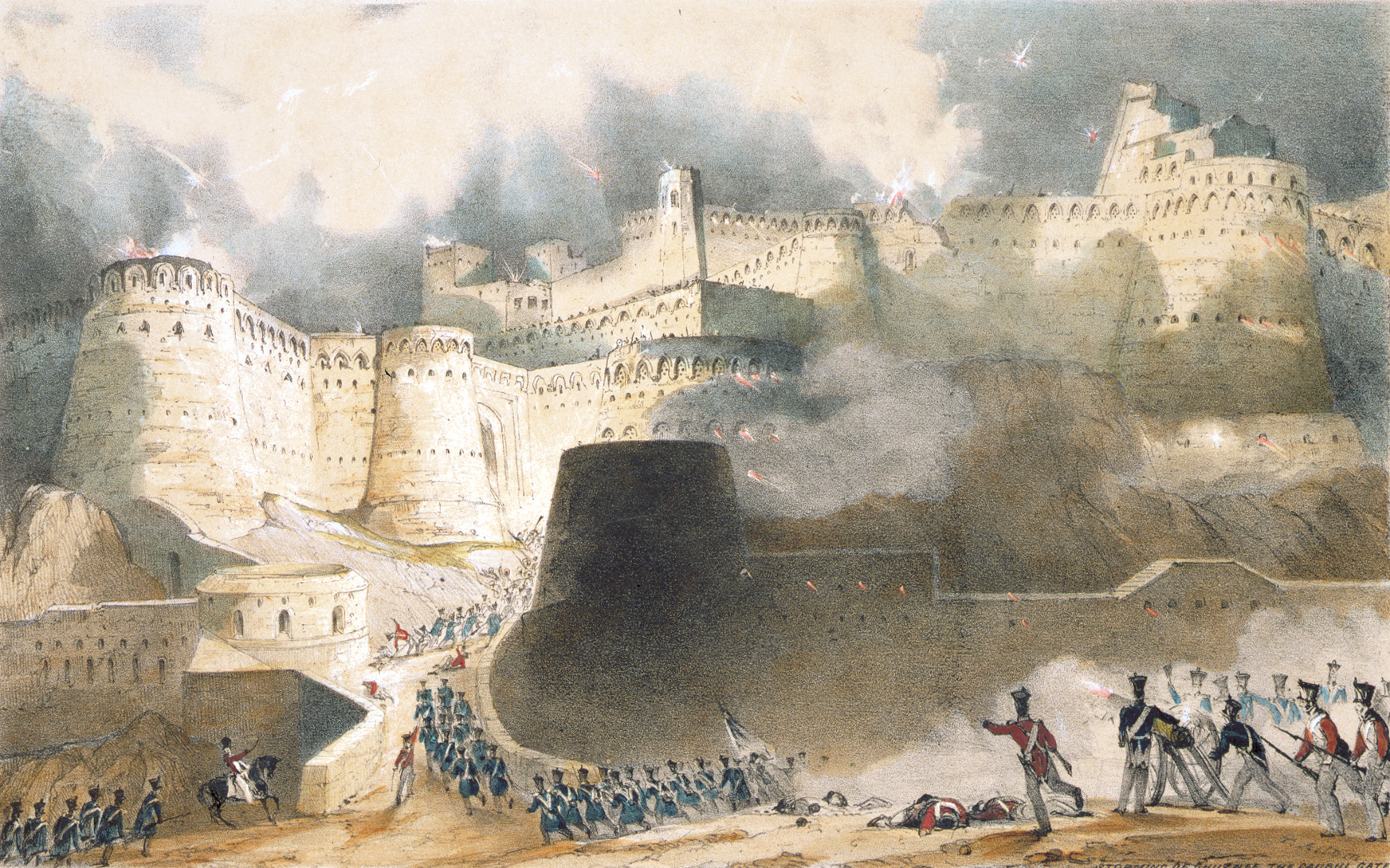
With No British Response, the Afghans Become Bolder
Upon learning of Burnes’ horrific end, many of the younger officers wanted to tear the city of Kabul down around the heads of his murderers brick by brick. From their superiors, however, no such mandate was received. Instead, Elphinstone and Macnaghten seemed to go into a kind of shock. Days passed, and still the British command did nothing. Even the Afghans were amazed. They had been expecting to pay a heavy price for Burnes’ head. When they understood that they had essentially gotten away with murder, the rioters underwent a kind of sea-change in their attitude toward their uninvited “guests.” The almighty British, it seemed, might not be quite so invincible after all. The number of rioters swelled, and with each passing day, as the British did nothing to persuade them otherwise, the Afghans became bolder and bolder still.
The element of fear had been removed. In its place there was now only a seething, unbridled contempt for the foreign devils. What had started as a riot fomented by cuckolded husbands was now a full-scale insurrection. On November 15, a badly wounded Major Eldred Pottinger and three other half-dead men somehow managed to reach the cantonment after a harrowing 40-mile trek from Charekar, an isolated garrison post just north of Kabul. It was Pottinger’s unhappy duty to inform Elphinstone that the garrison’s defenders, the men of the 4th Ghurkha Regiment, had been attacked and overwhelmed by some 20,000 Afghan tribesmen 10 days before. Of the 750 men-at-arms and their families—an estimated 140 women and children—only Pottinger’s small group had avoided destruction. The genie was now out of the bottle.
Despite the fact that he was in command of a force that still numbered 4,500 men, General Elphinstone continued to vacillate. Instead of a retaliatory show of strength, he kept his people holed up in the cantonment like rabbits gone to ground. On November 23, after several feeble attempts, he finally ordered his troops out into the field to destroy two field pieces that the Afghans had moved into position in the Behmaru Heights above the cantonment. At 2 am, a large force under the command of Brigadier John Shelton that included units of the 44th Queen’s Regiment, the 5th and the 37th Native Infantry regiments, and two squadrons of cavalry set out under cover of darkness and made their way up the heights. This was easily done, but when the troops encountered hostiles in a small Kohistani village nearby, they were unable to press the initiative. With the vital advantage of surprise lost, the situation quickly began to unravel for Shelton and his men. Alerted by the sounds of gunfire, thousands of Afghans from Kabul proper came rushing up the hill to join the fray. By dawn, 10,000 of them were shoulder to shoulder with their countrymen on the heights.
Shelton’s force had set out from the cantonment with only a single field piece of their own. The gun made short work of the attacking Afghans for a time, but once its vents overheated, the gun couldn’t be fired and became useless. Confronted with vastly superior numbers, the infantry detachment was forced to fall back from the summit. Enraged and emboldened, Afghans on horseback and on foot continued after them in hot pursuit. Unable to find adequate cover, in desperation the British formed a square and bravely began trading fire with their attackers. Incredibly, the standard-issue muskets of the British infantrymen were of a shorter range than those of their Afghan counterparts. Realizing this, the Afghans simply stayed out of their range as they rained fire down upon the British square with their longer range, deadly accurate jazails. Shelton’s hopelessly exposed cavalry squadrons fared no better.
In the face of this withering hail of bullets, the infantrymen broke ranks momentarily before their commander was able to get them back into formation. Providentially, their field gun had cooled down and was able to be put to good use once more. Turning the tables, the British began to decimate the Afghans for a second time. Then the Afghans, realizing that they either had to disable the gun or be completely destroyed, began to focus on eliminating the gun crew. This they did, and soon they were once again on the threshold of annihilating the remaining British infantrymen. Shelton ordered his cavalry to charge their tormentors but they refused. In the face of this pointless slaughter, Shelton was forced to order a general retreat. Wasting no time, what was left of the cavalry turned tail and bolted down the hill to safety. About to be overwhelmed, the infantry detachment broke ranks for a second time. Retreating in disorder as fast as their hob-nailed boots could carry them, they raced back to the cantonment. Behind them, on the hills above and along the slopes leading down to the plain, 300 of their comrades lay dead.
At this time, Dost Mohammed’s son, Mohammed Akbar, also known as Akbar Khan, entered Kabul at the head of 6,000 men. Immediately taking charge of the situation, he rallied the Kabulis to his banner and was soon in command of 30,000 Afghan fighters, all howling for English blood. Mohammed Akbar quickly saw to it that the merchants of Kabul no longer kept the British supplied with food or anything else, cutting the cantonment off completely from the outside world. Then on November 25, Mohammed Akbar offered to parley with the British under a flag of truce on the banks of the nearby Kabul River. He demanded that they agree to the immediate end of Shuja’s rule, that his father, Dost Mohammed, be returned to the throne at once, and that the British agree to leave Afghanistan and never return.
Macnaghten’s Scheming Ends Badly
Ever the intriguer, Macnaghten demurred but asked for a second meeting. Believing that some of the more ambitious local chieftains might actually prefer Shuja’s reign to that of a strong leader like Dost Mohammed, he played for time, and with the help of the redoubtable Mohan Lal attempted to play the competing sides against each other. At the second meeting on December 11, he blithely declared that the British no longer wished to support Shuja and were prepared to leave for India at once.
Macnaghten’s scheming appeared to be bearing fruit when Mohammed Akbar proposed a new set of terms at yet another parley: He would agree to let Shuja remain on the throne in Kabul if he—Akbar—were allowed to serve as his Grand Vizier. The British would be allowed to remain in Kabul in perfect safety through the winter, if they would agree to depart in the spring. Macnaghten readily accepted and agreed to seal the bargain at a special meeting on December 23, to be held, like all the others, along the banks of the Kabul River.
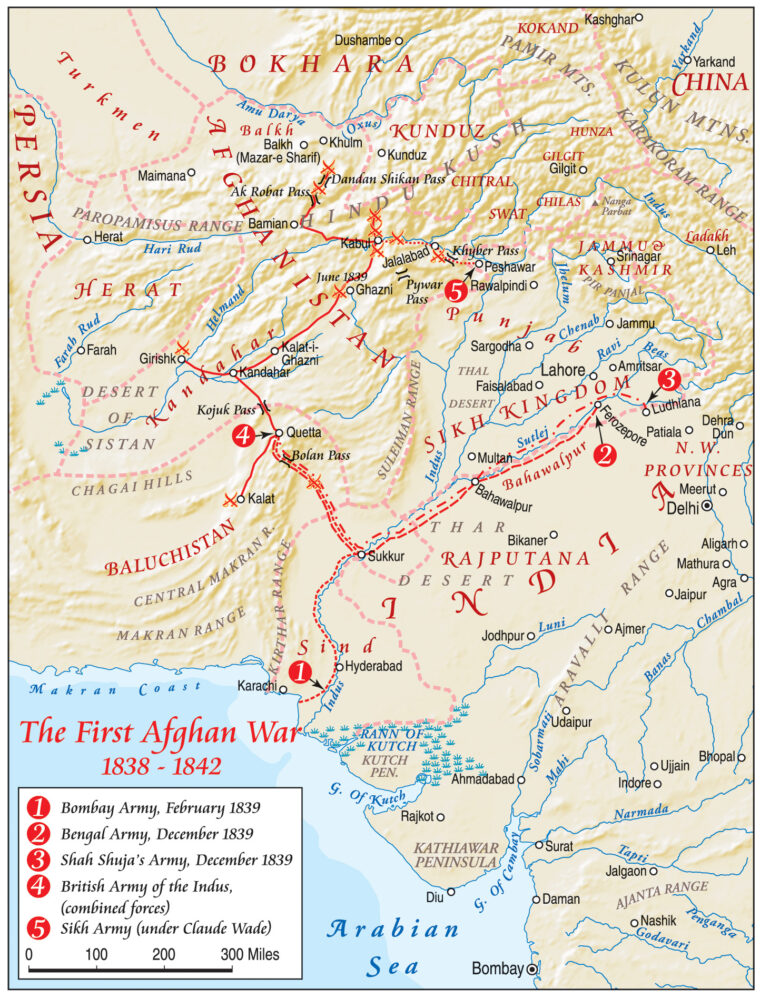
At the appointed time, high noon, Macnaghten and three aides rode out toward the meeting place, accompanied by a ceremonial escort of 10 mounted Indian troopers. Many in the cantonment, Mohan Lal among them, suspected treachery, but Macnaghten was convinced that his wily maneuverings had carried the day. All the same, Elphinstone was asked to place some of his soldiers on alert just to be on the safe side. This request apparently fell on deaf ears.
Macnaghten and the aides, George Lawrence, Colin Mackenzie, and Robert Trevor, quickly covered the half-mile and arrived at the riverbank. There they were met by Mohammed Akbar and his retinue. Carpets had been laid out in the snow and the two sides sat down together to finalize the agreement. As it turned out, Mohammed Akbar had known all along of Macnaghten’s machinations and had merely been baiting him.
He asked Macnaghten matter-of-factly if the new conditions were indeed acceptable to him. Macnaghten, suspecting nothing, jovially answered, “Why not?” With that, he and his companions were set upon by Mohammed Akbar’s men. Each of Macnaghten’s aides was hauled up over the saddles of three Afghan horsemen who rode wildly off toward Kabul. When one of the hapless men, Trevor, slipped off and tumbled to the ground, he was brutally butchered by a crowd of frenzied Afghans. With the exception of one trooper who was soon cut down for his pains, the entire mounted troop had fled back to the cantonment at the first signs of trouble.
As for Macnaghten, the silver-tongued arch-conspirator seemed finally at a loss for words. Shouting and screaming “For God’s sake!” he was dragged kicking and clawing down to the river’s edge, where he was killed by no less a personage than Mohammed Akbar himself, shot dead with one of a matched set of pistols that Macnaghten had presented to him sometime earlier as a ceremonial gift. Macnaghten’s lifeless body was then unceremoniously chopped apart. By day’s end his headless, limbless torso was stuck up on a pole in the Kabul bazaar, and his arms and legs had become the trophies of an ecstatic throng of Kabulis, who carried them gleefully around the city’s grimy precincts, to the hoarse cheers of the mob.
Although the troops in the cantonment could clearly see that something was going terribly wrong for Macnaghten and his aides, Elphinstone, once more, inexplicably did nothing. It was two days before Christmas.
Eldred Pottinger’s voice had been among the loudest in advising Macnaghten not to trust Mohammed Akbar. Now, he implored Elphinstone to attempt a breakout of the hopelessly exposed cantonment and to try to get his people to the Bala Hissar, where they would be considerably less vulnerable and stand a better chance of holding out.
Elphinstone refused, and instead ordered Pottinger, acting as Macnaghten’s de facto successor, to contact Mohammed Akbar and negotiate a surrender on his behalf. Mohammed Akbar demanded once again that the British leave Afghanistan at once. This time, he also insisted that they surrender their treasury and nearly all of their artillery before leaving. In addition, realizing that his father, Dost Mohammed, was still in exile in India and in essence a prisoner of the British, he demanded that some of the married officers and their families stay behind as hostages. If this was done, he would provide them with food and safe escort back to India. Elphinstone ordered Pottinger to inform Mohammed Akbar that with the exception of allowing women and children to serve as hostages, the terms were acceptable. Acting on his own initiative, Pottinger not only managed to get Mohammed Akbar to agree to let all of the families go, but also to take only a half-dozen of the officers hostage. The sick and wounded, though, would also have to be left behind, along with a pair of medical officers, who volunteered to remain with them. Pottinger was also able to keep six field pieces and some mule guns for what was left of the once- vaunted Army of the Indus. Their departure from Afghanistan would prove a far cry from their triumphant arrival.
Endgame
At 9 am on January 6, 1842, close to 17,000 bedraggled souls evacuated the cantonment. Up to the last minute, Pottinger had begged Elphinstone not to follow this course, but to make a pretense of leaving and then, at the last second, to make a run for it to the Bala Hissar. Instead they set off for India amid a multitude of horses, carts, and camels. At that time there were 700 British soldiers, their wives and children (34 in all), the 2,000 surviving members of the Bengal Native Infantry, 250 Bengal Cavalry, 1,150 Irregular Horse, 400 of Shuja’s remaining levies, and about 12,000 camp followers. The cavalry rode at the head of the advance column on that first day, followed by the main column led by General Shelton, including the remaining 400 infantrymen of the 44th Regiment of Foot. Behind them, traveling in carts or in huge woven baskets slung over the backs of camels, were the British women and children followed by the army’s rear guard. Traveling in their wake on foot, through the snow, were the Indian women and children, amid the thousands of camp followers.
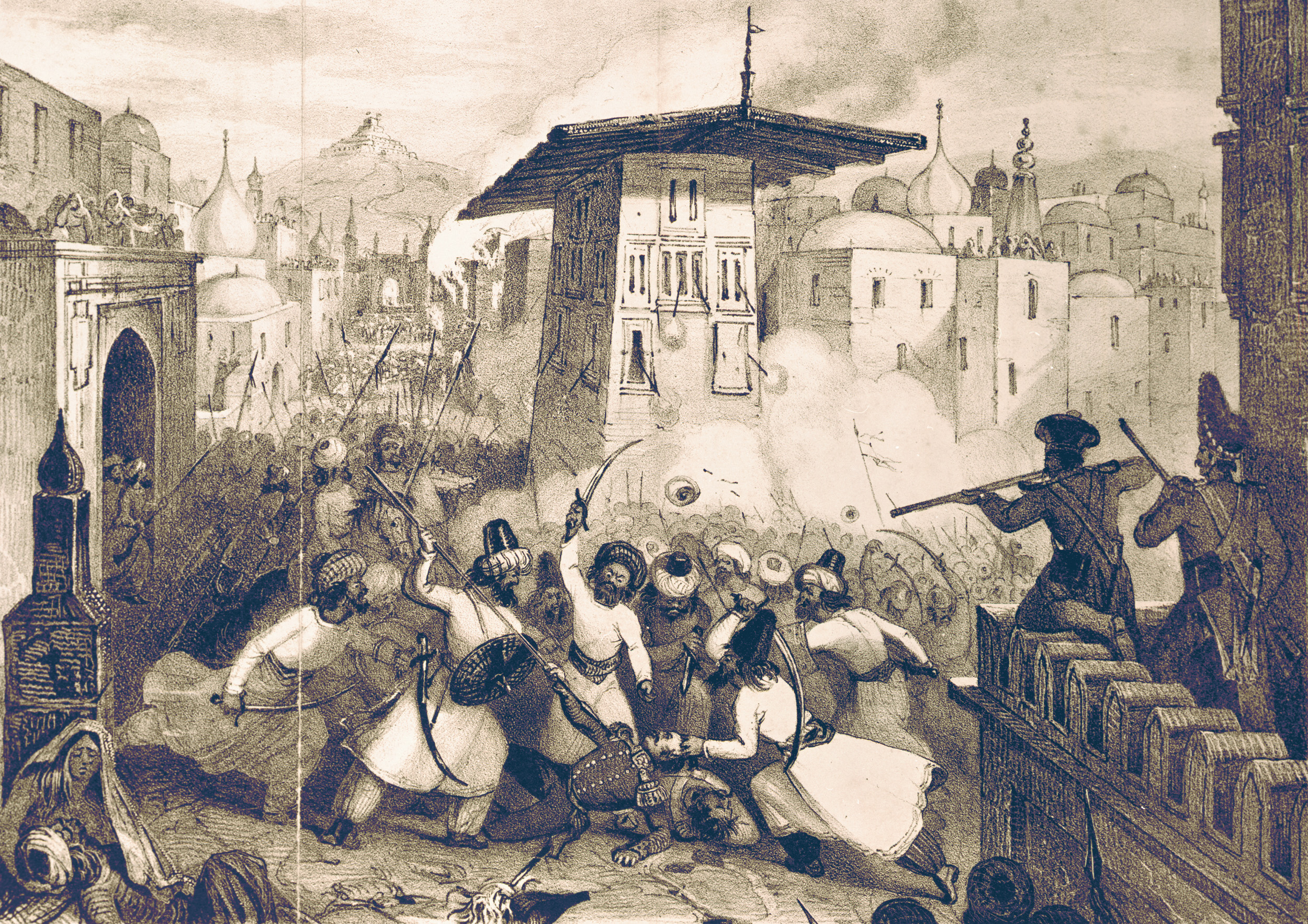
Their intended destination was the safety of the British garrison at Jalalabad some 90 miles away over the icy mountain passes. There was no sign of the promised safe escort. Instead, no sooner had they left the cantonment than an army of looters swarmed into the compound, tearing the place apart and snatching up everything in sight. From within the cantonment, intermittent sniper fire began picking off soldiers of the rear guard almost immediately. As the exodus continued Afghans on horseback began attacking the column, driving off the pack animals and firing indiscriminately at soldier and civilian alike, killing a great many. Among the camp followers, exhaustion and exposure were already claiming their first victims.
By nightfall, the evacuees had managed to cover only about five miles. The retreat had devolved into a disorganized rout. Nearly all of the pack animals of the baggage train had been stolen or lost and as a result, hardly of the army tents remained in their possession. Making camp for the night, all but a lucky few were reduced to bedding down as best they could on the snowy ground. Many did not survive the freezing night. Still others awoke to the agony of frostbite. Those who could not continue the march were left to their fate. It was only the morning of the second day. As the column marched on, its order of battle hopelessly compromised, the sniper fire and attacks by Afghan horsemen continued afresh and three of the mule guns were lost to their pursuers.
Later that day, Mohammed Akbar approached the column at the head of several hundred mounted fighters. Expressing grave concern, he began to upbraid Elphinstone for not waiting for his escort. Pottinger denounced this as a rather obvious sham. Elphinstone clung to the belief that the Afghan leader was simply hard-pressed to control his people. When it was suggested that Elphinstone call a halt to the march for 24 hours so that a bargain might be struck with the local chieftains, securing them safe passage through the nearby Khoord-Cabool Pass, he readily agreed, much to the disgust of Pottinger and the remaining political officers. Mohammed Akbar then shrewdly asked, or rather demanded, to be allowed to pick three additional hostages. Elphinstone again agreed and Mohammed Akbar promptly chose Pottinger and two of the politicos. Despite their obvious forebodings, Pottinger and the others obeyed orders and dutifully went into captivity, no doubt feeling that they would never see their comrades again.
On the third day, the weary, half-frozen, half-starved column hobbled its way onto the approaches of the Khoord-Cabool Pass. A narrow, treacherous, four-mile artery through the rocky snow-clad peaks, the pass soon became a highway of death. On the slopes above them, dozens of bloodthirsty Afghan warriors with their longer range muskets suddenly appeared and began firing on the defenseless column from every direction. Desperate to save their lives, the column quickly broke ranks and fled pell-mell in confusion and mortal terror. A half-frozen stream meandering its way along the bottom of the pass had to be crossed, back and forth, over a dozen times before the main body of survivors came out on the other side of the pass. Horribly, no safety was afforded them there.
As for the stragglers, the exhausted men, women, and children who could not keep up with the rest of the column, the Afghans soon made short work of them. They waited until the main portion of the column had cleared the pass and then fell upon the ragged, defenseless souls who were still lagging behind among the rocky, snowbound twists and turns. In this manner, several thousand people were brutally put to the sword. Accounts offered by survivors claim that Mohammed Akbar himself was seen riding about in the midst of the carnage, imploring his fellow Afghans in Persian—a language understood by at least some of the British—to cease firing, while simultaneously exhorting them in their own tongue to kill everyone they could lay their hands on.
On the following day, January 9, Mohammed Akbar and his retinue approached what was left of the column once again. Death—and in the case of the Sepoys, wholesale desertion—had taken its toll. By now, the Native Infantry regiments were reduced to about 60 men each. The irregular Horse counted just 100 mounted troopers left; the 5th Light Cavalry just 70. Of the Queen’s 44th, only about 200 Englishmen were still able to answer the rolls, a casualty rate of 90 percent. Still protesting his friendship, Mohammed Akbar professed himself to be greatly aggrieved by their plight, explaining that he was having great difficulty convincing the tribesmen in the region to forswear their attacks on the column. Elphinstone again chose to accept this explanation. Before departing, Mohammed Akbar, aware that by now additional bargaining chips might be needed to protect his captive father from British reprisals in India, offered his personal protection to any of the women and children who wished to leave the column. Intimating that they might be safer in his care for the time being, he suggested that they wait for the arrival of calmer political seas before attempting to go any farther. He then extended the offer to include any of their surviving husbands who wished to go along with them. Altogether, four men, 13 women, and 16 children, obviously desperate and literally gambling with their lives, left the column and rode off with the man most believed to be responsible for the continuing slaughter.
Shortly thereafter and throughout the next day, the column was again subjected to repeated guerrilla attacks as it continued its tortuous trek through the frigid, windswept wilderness. The misery and death that had stalked them from the outset of their journey seemed only to intensify. Tortured by hunger and thirst, some tried to eat snow. Those who were not felled by bullets succumbed to the elements and froze to death. Many went snow-blind and were left behind by the others, casualties in the cruel calculus of survival. Abandoned by their compatriots, they soon found themselves being battered and slashed at by unseen hands. Untold dozens shared this particularly gruesome fate, stabbed to death by the knives of their pitiless tormentors as they stumbled and crawled helplessly among the snowdrifts.
Elphinstone Finally Seeks Help
By the time the veil of night descended upon the shattered remnant of General Elphinstone’s command that tenth day of January, it is thought that as few as 750 men-at-arms and perhaps 4,000 civilians remained out of the close to 17,000 souls who had set off from Kabul just six days before. By January 12, that number had been further reduced to something like 200 soldiers and about 2,000 civilians as the marauding Afghans continued their frenzied assaults on what was left of the column.
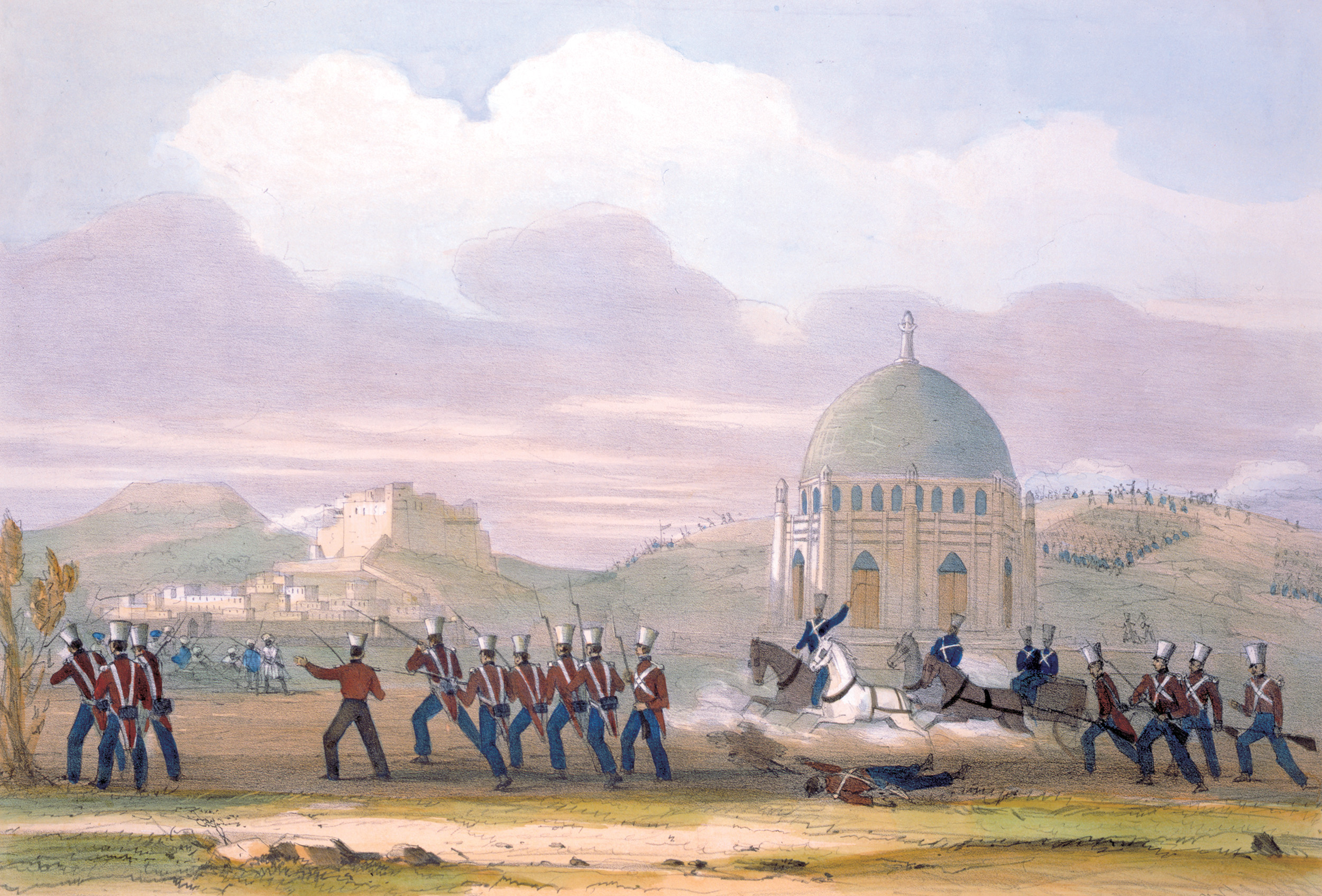
Once again, Mohammed Akbar made his presence known to the British. He had been shadowing the column throughout their ordeal. Now, he made the dazed survivors yet another cynical offer of protection and eventual safe conduct back to India. Astonishingly, General Elphinstone agreed to meet with him. To the surprise of no one except possibly himself, Elphinstone was promptly seized upon entering Mohammed Akbar’s encampment. He now had the dubious distinction of being the Afghan’s most illustrious hostage. General Shelton and several others accompanying him were also captured.
At long last, it finally dawned on Elphinstone that Mohammed Akbar was in no position to provide protection to the British even if he had wanted to. The vengeful, warriors of the Afghan hinterland were not to be denied their pound of flesh. The old general somehow managed to smuggle a message back to Brigadier Thomas Anquetil, his next in command, ordering what was left of the column to press on with all possible dispatch. This they did. Moving out under cover of darkness, they made their way up over the hills and through the mountains until they came to the one last mountain pass they would have to cross on their way out of that accursed country: Jagdalak.
Edging ever closer, they made a sickening discovery. The Afghans had erected a home-made killing zone at the mouth of the Jagdalak Pass, a barrier of vicious thornbushes that stretched across the entranceway from one end to the other, blocking it completely. Providentially, the Afghans had apparently become so used to Elphinstone’s inertia that they left their would-be abattoir unguarded, confident that even in his absence his subordinates could be counted on to behave with equal vacillation.
Clawing at the barrier with their bare hands, the exhausted soldiers desperately tried to clear a path for themselves through the thorns. With bleeding half-frozen fingers, they finally succeeded in making a small opening. At that very moment, the slopes all around them erupted with gunfire, as once again the Afghans came howling down at them from the hills. It was as if the entire mountainside had come falling down upon them all at once. Still more Afghans came rushing up after them from behind, shooting and slashing away for all they were worth. As all hell broke loose in the mad, murderous crush against the thorny barricade, the situation devolved into the simple, ugly matter of every man for himself. Anquetil and a dozen other officers were among those killed. At this point, only a handful of the surviving officers and cavalrymen still had their mounts. It was there at the barricade that one of these lucky few, an army surgeon named William Brydon, was pulled from his horse by a multitude of clutching hands intent on separating him from his head.
William Brydon’s Amazing Escape
In the bitter cold of the Afghan winter, many of the British had resorted to insulating their uniforms and clothing with layers of cloth, sheets of old newspapers, and anything else they could find in a desperate attempt to keep warm. Thanks to the tattered periodical that Brydon had tucked into his cap, an old copy of Blackwood’s Magazine, the Afghan blade that would otherwise have pierced his skull in the chaos that followed was deflected away. Instead, Brydon somehow managed to fight his way out of the roiling mass of humanity and pull himself through the small opening between the thorns, to emerge bruised and battered on the other side.
There, lying on the ground a short distance in front of him, he came upon a mortally wounded Indian Cavalryman still gripping the reins of his horse. He had been one of about 15 horsemen who had been able to get both themselves and their mounts through the breach in the first moments of the attack. According to Brydon’s account, the dying man pressed the reins into his hands and wished him Godspeed before dying in his arms. With little time to waste, Brydon hauled himself up into the saddle and galloped away into the darkness. Dr. Brydon was one of fewer than 80 men who managed to claw their way through that narrow breach that night. There at the barricade, by bullet and blade, the remainder perished, rent by the thorns and by the long knives of the Afghans.
Now all that remained of Macnaghten’s vainglorious Army of the Indus was a pitiful remnant, split by force of circumstance into two groups. One was composed of Dr. Brydon and five others, all on horseback. Together at the gallop, they charged, hell-bent for leather through the hostile countryside, throughout the night and into the following day. The other group, traveling on foot with only 40 rounds of ammunition among them, was composed of 45 infantrymen belonging to the 44th Regiment of Foot, along with 20 of their officers. Each group was desperately trying to reach Jalalabad and the safety of the British garrison there.
On January 13, at a place called Gandamak, the pitiful remnant of the once-proud 44th Regiment of Foot, with only two rounds of ammunition left, were again set upon by Afghan tribesmen and quickly found themselves completely surrounded. Exhausted and at the end of their ropes, they formed a defensive square as they had so many times before and prepared to face whatever came. To a man, they fixed bayonets and resolved to die fighting on their feet, with rifles in hand, like soldiers. In the savage onslaught that followed, the regiment effectively ceased to exist. In a strange twist of fate, Captain Souter, who’d wrapped the regimental colors around his waist in an effort to save them from the enemy, was spared. Taking the colors as a sign that this was a high-born personage or someone of great rank, the same Ghilzye tribesmen who had slaughtered his comrades went to great pains to take Souter alive, assuming that he would fetch a king’s ransom. They were only 30 miles from Jalalabad.
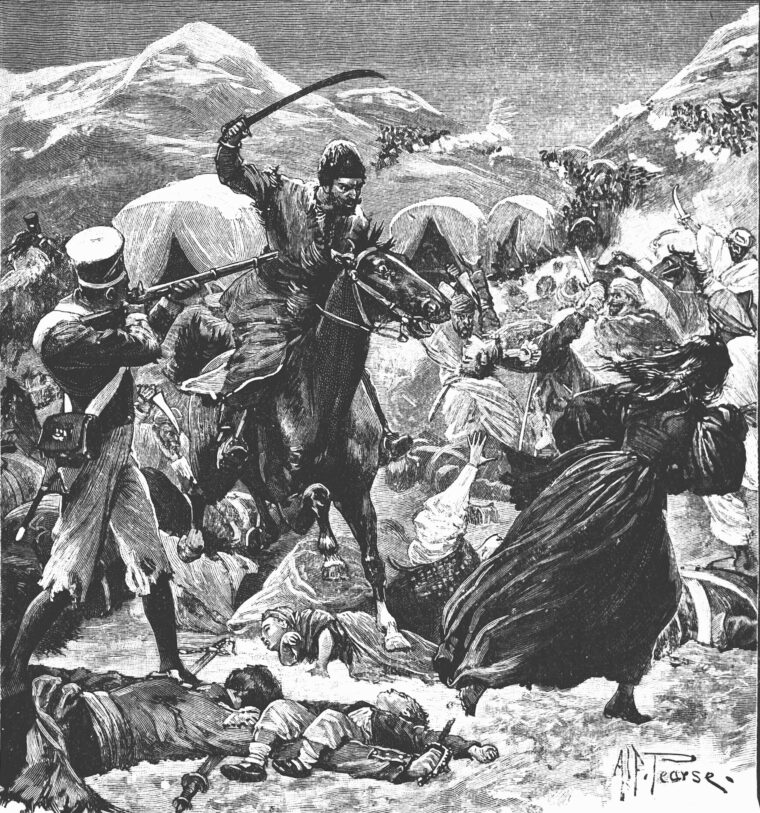
Dr. Brydon and the others fortunate enough to be on horseback actually got to within 15 miles of Jalalabad when they came upon the tiny village of Futtehabad. Numb with exhaustion, they foolishly trusted the smiling villagers who offered them food and drink and the opportunity to rest the horses as well as themselves. No sooner had they dismounted than their cunning hosts sprang the trap. Suddenly, a horde of mounted Afghan warriors, some wielding muskets, others waving swords over their heads, came roaring into the village. Howling like Banshees, they rushed straight at the startled Britishers, mowing down two of them on the spot. Somehow, Brydon and four others managed to get to their horses and flee for their lives. The Afghans, however, were not about to let the last of these infidels slip through their fingers so easily. Pursuing them relentlessly, they picked off first one, then another and another, until only Brydon remained.
On and on he rode, through a vicious human gauntlet, as again and again, like demons from hell, his tormenters seemed to rise up from behind every solitary bush and boulder, each one, in turn, trying their damnedest to kill him. In those last few miles as he made his mad dash for Jalalabad, he was attacked in deadly earnest at least three times. Somehow he managed to fight them off each time. In one of the last of these, an Afghan musketball came so close to blasting him out of the saddle that it struck his saber, snapping off the blade. In the end, he was reduced to fending off the last of the assaults by literally hurling the hilt of his saber into the face of one of his attackers. Bloody, bruised, and battered, Brydon drove his mount on until, after a while, he found himself quite out in the open on a broad plain. The Afghans seemed to have melted away. Still half expecting to be pulled from his horse at any moment, he rode painfully on until his red-rimmed eyes could just make out the massive walls of Jalalabad rising up at him out of the near distance, followed soon after by the unmistakable sight of a detachment of British cavalry riding out of the garrison to bring him in. Like Ishmael, it seemed, he alone had survived.
A Bloody Retort
When word of the catastrophe reached the British government, their response was as predictable as it was bloody. Come the spring, they returned to Afghanistan in force. Two armies, one under the command of General Sir William Nott and the other under General George Pollock, smashed their way through the medieval realm like twin battering rams, hitting the Afghans with everything they had. This time they remembered to bring the heavy artillery. Jalalabad was quickly reinforced and Kandahar, too, became a permanent British bastion. Marching over the mountains and down onto the barren plains, the forest of skeletons the British encountered along the way told them all they needed to know about what had happened to their kinsmen.
In a fury of revenge and destruction they blasted away at everything and everyone in their path. The storied walls of Ghazni, which had stood for centuries, were literally torn down around the ears of its inhabitants. Kabul itself was reached in only a few months. As for Elphinstone and the others held hostage by Mohammed Akbar, Pottinger and Shelton included, and several more from the column taken into captivity by the Afghans during the exodus, they had all been sent to Bamiyan, some distance north of Kabul, in an effort to thwart any would-be rescuers. There, Mohammed Akbar had hoped to sell them all as slaves and later disavow any knowledge of them. As the British approached, he even succeeded in flushing Shah Shuja out of the Bala Hissar (which had withstood the siege after all, much as Pottinger had said it would) using the tried-and-true pledge of safe conduct. Whereupon Mohammed Akbar promptly had Shuja murdered. He was obviously attempting to tie up loose ends.
It was all for naught. Mohammed Akbar’s support quickly crumbled in the face of the inexorable British advance. Fleeing Kabul in great haste, he disappeared from the pages of history as the forces of his enemies entered the city for the second time. As before, the city was taken without a shot being fired, and before long General Pollock had Shuja’s son Futteh installed in the Bala Hissar.
Withdrawal to India
By this time, Elphinstone, worn out and wracked with fever and dysentery, had had the good sense to die. Miraculously though, Pottinger and several of the other hostages managed to defy Mohammed Akbar’s attempts to dispose of them. Altogether, 22 officers, 37 soldiers, 19 women, and 22 children continued to draw breath at Bamiyan. With two British armies rampaging through the countryside, Pottinger was able to convince his jailers that it was in their best interests to keep the hostages together and alive if they hoped to avoid destruction themselves. This line of reasoning was further strengthened by a bribe of 20,000 rupees, which Pottinger had somehow managed to keep hidden from his captors, and the promise of a monthly pension. The argument proved so convincing that by the time the British learned of their survival and a rescue force of some 600 mounted irregulars under the command of Captain Sir Richard Shakespear finally reached Bamiyan, they were astonished to find the hostages being protected by a bodyguard made up of their former jailers. The world, it seemed, had turned once again.
On October 11, after thoroughly looting Kabul and dynamiting the city’s enormous covered bazaar in a final act of spite, the British pulled their troops out and returned to India. Predictably, the Kabulis deposed Shuja’s heir Futteh almost immediately thereafter. The British, still stubbornly determined to exert some measure of control over the resiliently recalcitrant Afghans, promptly began casting around for a suitable replacement who might be able to bring them to heel. In a final irony, they eventually found one there in India, an exiled Afghan prince who had grown to be quite fond of the British during his years there as a “guest” of the British government. His name was Dost Mohammed.
